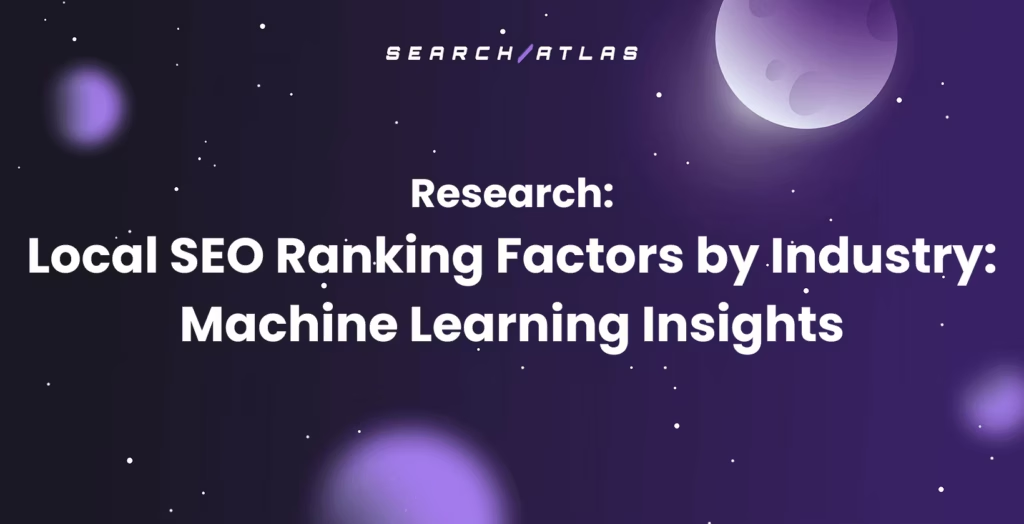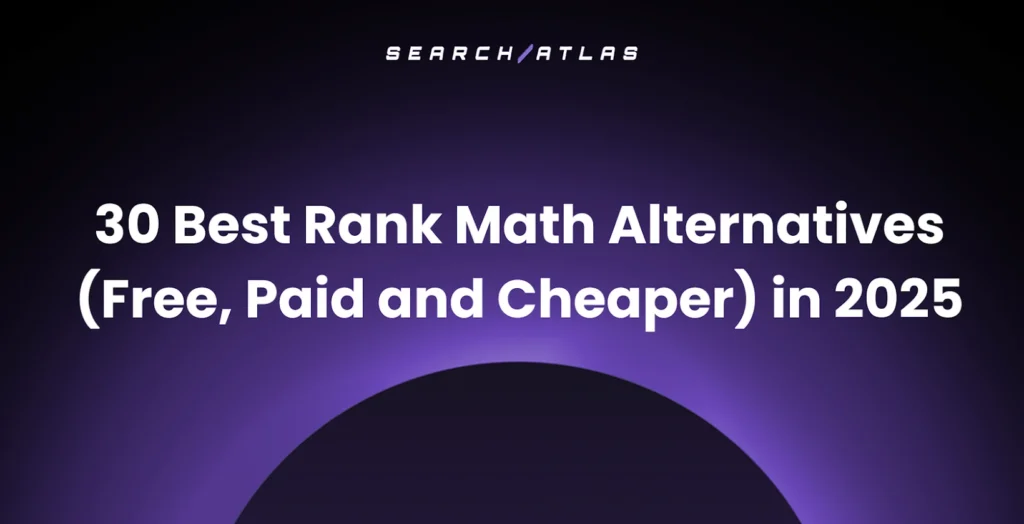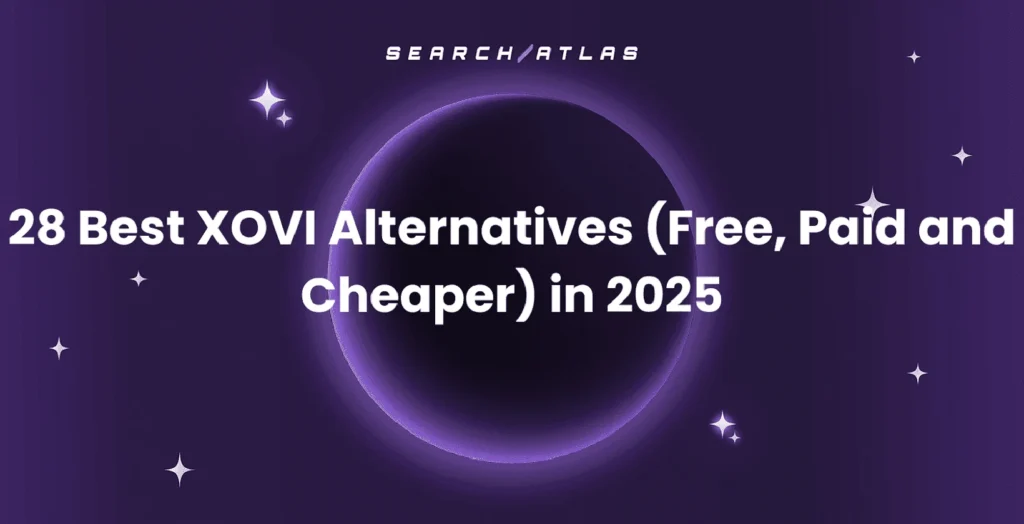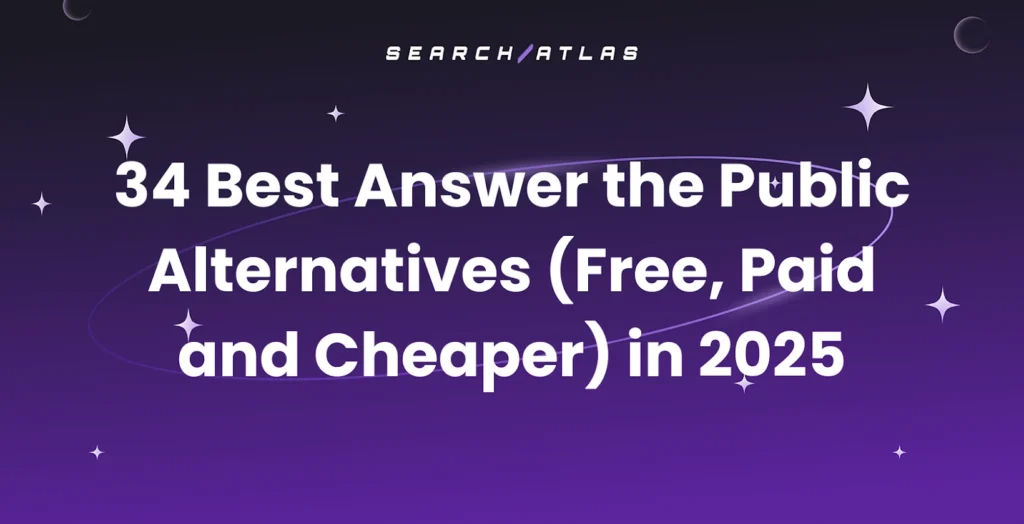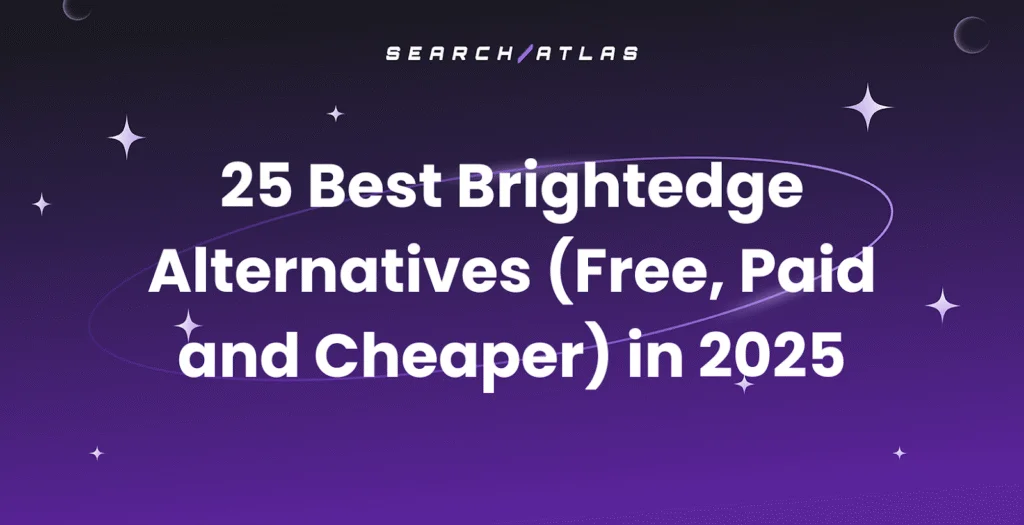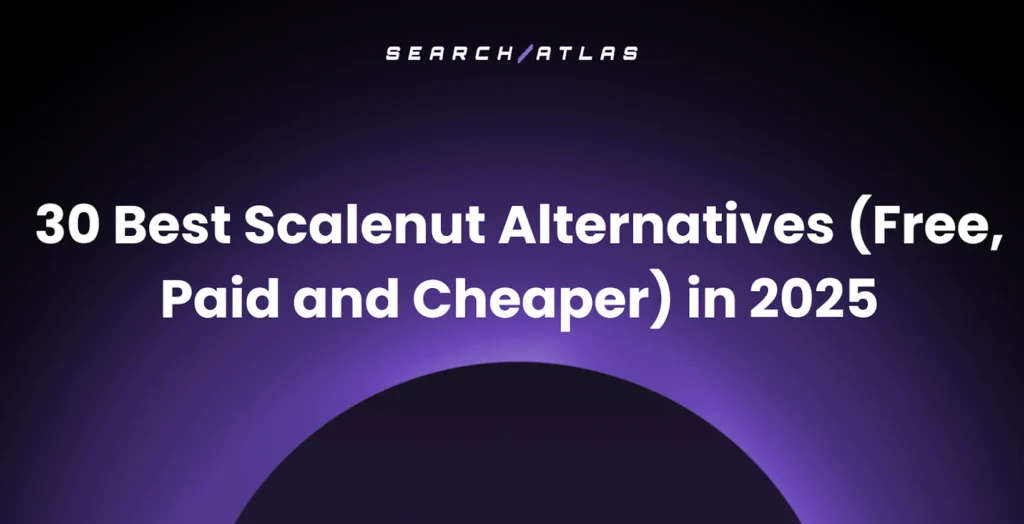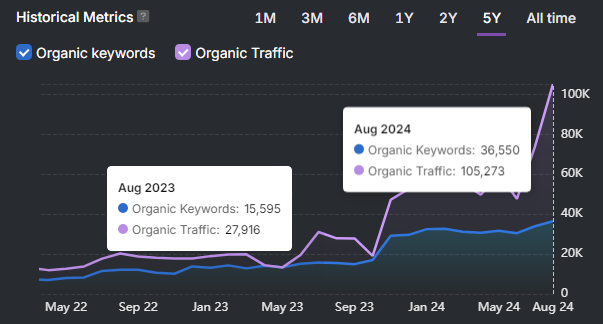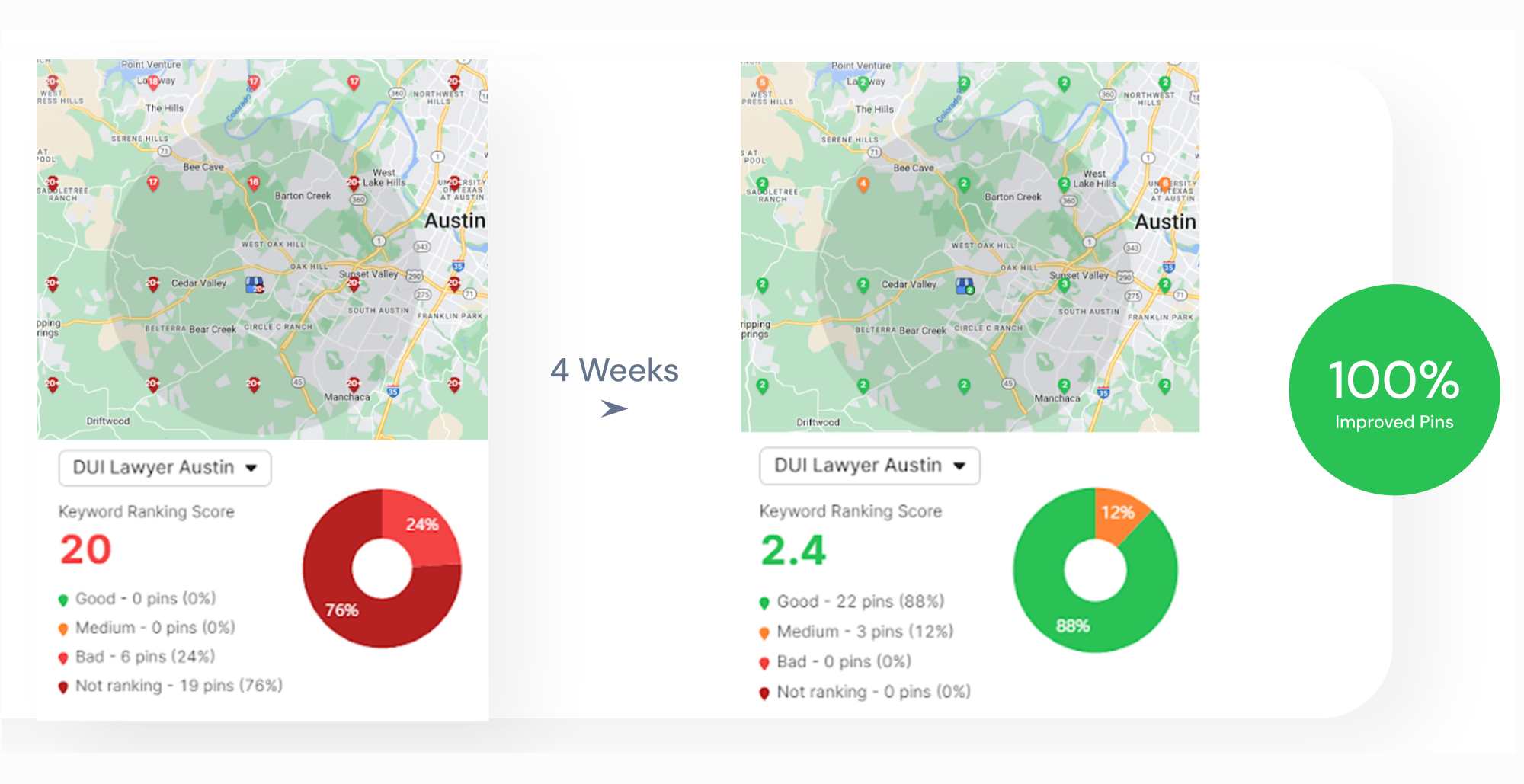SEO tools are softwares that help websites rank higher in search results by providing data, automation, and optimization for main workflows like keyword research, content production and optimization, technical audits, backlink tracking, and SEO reporting. SEO tools support marketers, SEO professionals, and website owners by turning search engine signals into actionable insights. The best SEO software combines ranking data, crawl diagnostics, SERP analysis, and content scoring into a single interface.
Search Atlas leads this year’s list as the best all-in-one SEO platform. Search Atlas SEO platform combines real-time Google data, AI automation, and full-funnel SEO execution, which makes it the most complete and scalable SEO tool in 2025. Other SEO tools in this guide specialize in rank tracking (AccuRanker), site audits (Screaming Frog), backlink analysis (Ahrefs), and local listings (BrightLocal).
Whether you need SEO ranking tools, reporting dashboards, or the best SEO software for your stack, our list of tested SEO tools compares the most effective apps available today.
What are the Top 25 Best SEO Tools for 2025?
The top 25 best SEO tools for 2025 deliver reliability, accuracy, speed, and ease of use. Some are full-suite SEO platforms, while others are the best SEO software focused on a single task or specialty.
The top 25 best SEO tools for 2025 are listed below.
| Tool | Best For | Key Features | Pricing | Free Trial |
| Search Atlas | All-in-one SEO | OTTO SEO, Site Auditor, Content Assistant, Link Building, Reporting | From $99/mo | Yes |
| Screaming Frog | Site Audit | Site Crawler, JS Rendering, Structured Data Validation, Crawl Comparison | $259/year | Yes (500 URLs) |
| BrightLocal | Managing Local Listings | Local Rank Tracker, Citation Builder, GBP Audit, Review Monitoring | $39–$59/mo | Yes |
| Yoast SEO | WordPress SEO | On-page Analysis, Schema, Canonicals, Readability, Indexing Controls | Free or $99/year | Free plan |
| BuzzSumo | Content Engagement | Trending Topics, Content Analyzer, Influencer Database, Media Monitoring | $199–$999/mo | Yes |
| Clearscope | Content Optimization | Content Grader, SERP Analysis, Term Suggestions, Google Docs Plugin | $189+/mo | No |
| BuzzStream | Link Building Outreach | Link Prospecting, Email Outreach, Campaign Tracking, Backlink Monitoring | $24–$999/mo | Yes |
| Writesonic | AI Content Writing | AI Article Writing, Topic Research, CMS Publishing, Brand Voice Settings | $39–$399/mo | Yes |
| Whitespark | Citation Building | Local Citation Finder, GBP Management, Rank Tracking, Review Campaigns | $1–$149/mo | Yes |
| Semrush | Keyword Research | Keyword Magic Tool, Position Tracking, Content Analyzer, Site Audit | $139.95–$499.95/mo | Yes |
| Ahrefs | Backlink Analysis | Site Explorer, Keywords Explorer, Content Gap, Backlink Analysis | $129–$1499+/mo | Yes |
| AgencyAnalytics | Reporting | White Label Dashboards, Campaign Reports, Rank & Backlink Tools | $79–$479/mo | Yes |
| AccuRanker | Rank Tracking | Daily Rank Tracking, SERP Features, Share of Voice, API | $129–$2769/mo | Yes |
| Moz Local | Local SEO Management | Listing Sync, Review Monitoring, Social Tracking, GeoRank Tracking | $16–$33/mo | No |
| Alli AI | SEO Automation | Live Editing, Bulk Rules, Tagging, CMS Support, AI Optimization | $169–$1249/mo | Yes |
| SpyFu | Competitor Analysis | Keyword Gaps, Ad History, Backlink Gaps, RivalFlow AI Content | $39+/mo | Yes |
| Google Search Console | Monitoring Site Performance | Index Coverage, Keyword CTR, Core Web Vitals, Manual Actions | Free | Free |
| AnswerThePublic | Revealing Search Intent | Autocomplete Clusters, Questions, Comparisons, Keyword Exports | $5–$99/mo | Yes |
| Moz | Monitoring Domain Authority | Keyword Explorer, DA Tracking, Link Explorer, Site Crawl, MozBar | $39–$239/mo | Yes |
| Local Falcon | Tracking Local Rankings in GBP | Geo-Grid Scans, Falcon AI, Competitor Zones, Review Analysis | $24.99–$199.99/mo | No |
| Detailed SEO | Chrome Extension SEO Audit | Metadata Audit, Schema Viewer, Header Outline, PAA Extractor | Free | Free |
| Similarweb | Analyzing Web Traffic | Traffic Sources, SERP Features, Chatbot Traffic, PPC Spend Analysis | $199–$35,000+/year | Yes |
| Raven Tools | White Label Reporting | Custom Reports, Keyword Tracker, Site Audit, Backlink Monitoring | $39–$399/mo | Yes |
| Google Analytics 4 | User Engagement Analysis | Event Tracking, Funnel Reports, Ads Integration, Page Speed Metrics | Free | Free |
| Frase | Content Creation | SERP Analyzer, Brief Builder, AI Writer, Optimization Scores | $45+/mo | Yes |
1. Search Atlas (Best SEO Tool Overall)
Search Atlas is an all-in-one SEO and PPC platform built for marketers, agencies, and website owners who need high-trust data, AI-powered automation, and full-stack SEO features in one workspace. The Search Atlas SEO platform combines AI-driven optimization, technical SEO, link-building systems, local visibility tools, and real-time Google data under one roof.
Search Atlas connects directly to Google Search Console, Google Analytics 4 (GA4), and Google Business Profile (GBP) to deliver real metrics, automate decision-making, and power results that compound, unlike platforms that rely on scraped datasets or partial automation.
What is Search Atlas Best For?
Search Atlas is the best all-in-one, AI SEO platform for SEO consultants, in-house marketers, agencies, and site owners that need precision, scale, and control without switching tools. The Search Atlas SEO software supports full-funnel workflows from keyword discovery and content creation to technical health and link velocity, backed by proprietary solutions like OTTO SEO, Link Laboratory, and Signal Genesys. The user-friendly interface makes it the preferred choice for businesses of all sizes.
What are the Best Features of Search Atlas?
The best features of Search Atlas are high-scale performance tools across on-page, technical, local, and off-page SEO workflows. The proprietary infrastructure, real-time data access, and task automation replace fragmented tool stacks with a single, unified platform.
The best features of the Search Atlas SEO platform are listed below.
- OTTO SEO (AI Automation Assistant) handles SEO execution across the funnel. OTTO SEO is an AI SEO tool that optimizes on-page elements, fixes technical issues, rewrites metadata, builds internal links, automates outreach, and enables dynamic and instant indexing.
- Keyword Research Tool surfaces high-intent keywords by city, region, or topic cluster. Each keyword includes volume, difficulty, SERP features, and commercial metrics.
- SEO Content Assistant combines keyword clustering, topic discovery, AI-assisted outlines, NLP optimization, visual editing, and brand-safe publishing.
- SCHOLAR decodes Google’s ranking logic with algorithmic precision, grading your content clarity, factuality, precision, human effort, and information gain.
- Site Auditor checks Core Web Vitals, server status, page indexability, JavaScript rendering, broken links, duplicate content, and structured data usage. It links each error to actionable fixes.
- Link Building Outreach and Digital PR Tool maps backlink profiles, discovers competitor link sources, automates personalized outreach, and tracks response rates.
- Local SEO Suite generates real-time location-based ranking Local SEO Heatmaps using GPS-accurate data across any city or radius. The citation manager distributes consistent business information to 100+ directories. The local SEO toolkit allows GBP integration and adjustments.
- Report Builder lets users build white-labeled, client-ready reports with live metrics from GSC, GA4, backlink profiles, local rankings, and content scorecards.
A full breakdown of how Search Atlas tools perform across real-world SEO use cases is available in the full Search Atlas SEO Tool Review, including workflow coverage, automation depth, and system-level feature integration.
What Is the Pricing Structure of Search Atlas?
Search Atlas offers a free 7-day trial. Paid plans for Search Atlas start from $99/month and vary by usage volume and feature access, with OTTO, citation management, and multi-domain reporting available on mid-tier plans. Enterprise packages support unlimited websites, white labeling, team roles, and API access.
2. Screaming Frog (Best for Site Audit)
Screaming Frog is a premium SEO audit tool. As a desktop-based SEO crawler, Streaming Frog is built for technical site audits, enterprise-scale diagnostics, and URL-level inspection. The tool emulates how search engines crawl a site to uncover technical issues that affect visibility, indexation, and page structure.
What Is Screaming Frog Best For?
Screaming Frog is best for site audits. Screaming Frog is suited for technical SEO leads and developers auditing JavaScript-heavy sites, staging environments, or complex architectures with crawl depth and page speed concerns.
It fits agencies running recurring technical audits, migration QA, or in-house SEO teams debugging canonicalization, structured data, or crawl budget issues on enterprise websites.
What Are the Best Features of Screaming Frog?
The best features of Screaming Frog offer deep site crawling capabilities with flexible configuration, custom data extraction, and integration support.
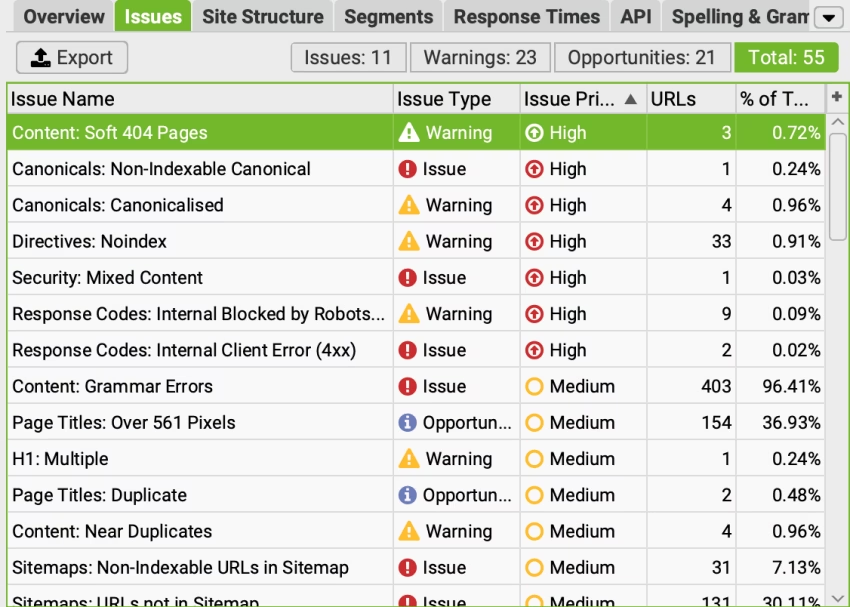
The best features of Screaming Frog are listed below.
- Site Crawler detects broken links, redirect chains, duplicate pages, and blocked resources across all internal and external URLs.
- JavaScript Rendering Engine crawls dynamic frameworks like React and Angular to surface delayed content and hidden links.
- Custom Extraction Tool scrapes specific on-page elements such as meta tags, schema, prices, or product SKUs using XPath or regex.
- Structured Data Validator tests Schema.org, AMP, and OpenGraph markup for completeness, accuracy, and search eligibility.
- GA4, GSC, and PSI Integrations import user metrics, index status, and speed diagnostics directly into crawl data.
- Site Visualizations map internal link structure, crawl depth, and URL silos using interactive tree graphs and force-directed diagrams.
- Crawl Comparison Engine tracks changes in SEO issues across versions, staging environments, or time-based audits.
Each Screaming Frog technical SEO feature contributes to broader SEO goals such as visibility, efficiency, and performance tracking. A full breakdown is provided in the Screaming Frog Review.
What Is the Pricing Structure of Screaming Frog?
The free version of Screaming Frog supports up to 500 URLs per crawl. The paid license costs $259/year and includes JavaScript crawling, scheduling, API access, custom extraction, and advanced configuration.
3. BrightLocal (Best for Managing Local Listings)
BrightLocal is a solid local SEO platform that tracks map pack visibility, manages GBP listings, and audits local rankings. BrightLocal provides tools for citation management, local SEO reporting, and reputation monitoring across all major directories and review platforms.
BrightLocal stands out for its hyperlocal tracking, GBP integration, and ability to visualize performance at the city, ZIP code, or multi-location level.
What Is BrightLocal Best For?
BrightLocal is best for agencies managing over 10 Google Business Profiles or service-area businesses competing in multiple zip codes. It suits consultants who optimize local pack performance, track spam competitors, and need scalable solutions for citations, review monitoring, and GBP audits.
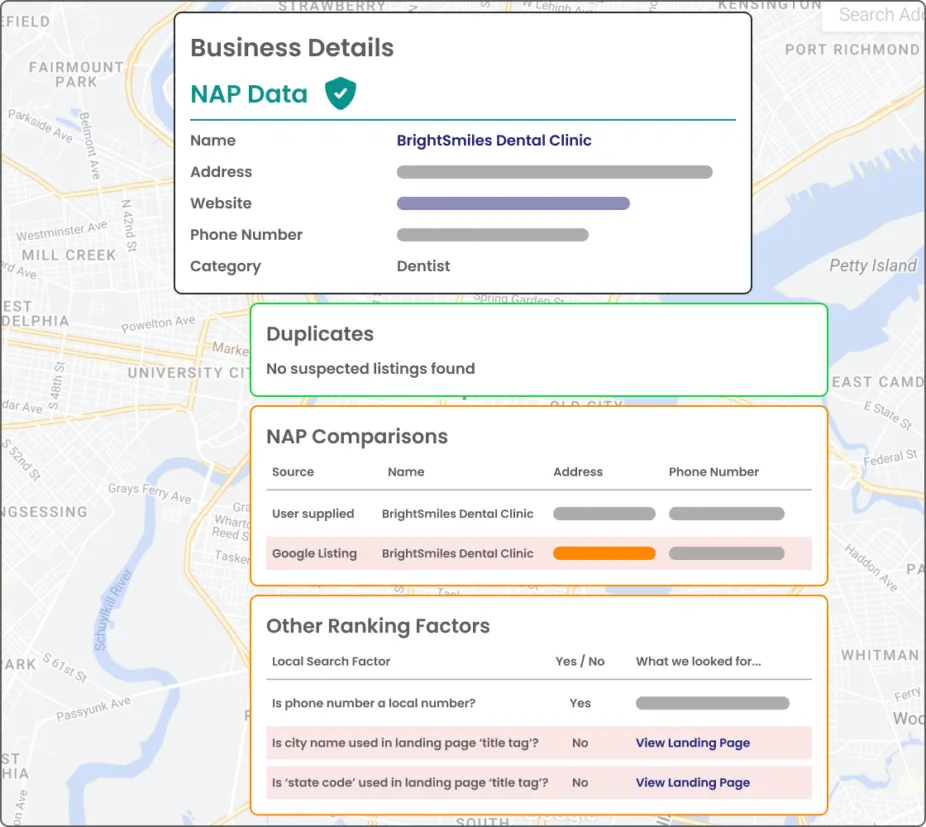
What Are the Best Features of BrightLocal?
The best features of BrightLocal include location intelligence tools, review monitoring, and automated reporting for local search. The best features of BrightLocal are listed below.
- Local Search Rank Tracker tracks map pack, organic, and mobile rankings at the city or ZIP code level.
- Google Business Profile Audit reviews listing accuracy, competitor visibility, and profile optimization opportunities.
- Citation Builder submits business information to 1,400+ directories with optional manual review and cleanup services.
- Reputation Manager monitors reviews across 80+ sites and requests new ones using email and SMS campaigns.
- Local Search Grid generates a geo-grid of SERP rankings across a defined service area to detect ranking drop-offs.
- Automated White-Label Reports combine GBP performance, local rankings, and citation status for clients or stakeholders.
An extensive evaluation of how BrightLocal supports local SEO audits, listings, and reporting workflows is available in the BrightLocal Review.
What Is the Pricing Structure of BrightLocal?
BrightLocal offers a modular pricing structure based on feature access and business size. The Track Plan costs $39/month and includes local SEO tools for rankings, audit reports, and Google Business Profile tracking. The Grow Plan starts at $49/month and adds citation builder access, review management, and white-label reporting. The Expand Plan is $59/month and supports multiple locations, custom report branding, and more integrations.
4. Yoast SEO (Best WordPress SEO plugin)
Yoast SEO is an essential WordPress SEO plugin tool that manages on-page SEO, schema markup, and content readability from inside the CMS. Yoast SEO adds real-time recommendations while you edit posts or pages and helps non-technical users optimize metadata, internal links, and page-level indexing decisions.
What Is Yoast SEO Best For?
Yoast SEO is best for WordPress site owners, content marketers, and editors who want real-time content SEO suggestions without leaving the dashboard. It suits publishers focused on structured metadata, readability improvements, and controlling how posts appear in search.
What Are the Best Features of Yoast SEO?
The best features of Yoast SEO simplify on-page optimization for WordPress through live feedback, crawl controls, and schema generation.
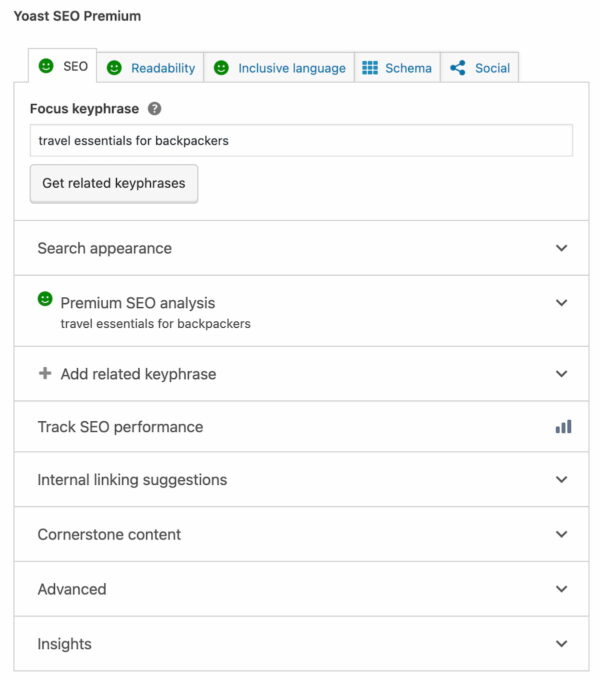
The best features of Yoast SEO are listed below.
- SEO Analysis Panel evaluates title tags, keyword placement, image alt text, and internal links while writing inside WordPress.
- Readability Checker flags sentence length, passive voice, and transition word issues based on Flesch reading standards.
- Social Preview Tool customizes social media titles, descriptions, and images before sharing on platforms like Facebook and X.
- Canonical URL Control lets you set canonical tags for posts, taxonomies, and archive pages to avoid duplicate indexing.
- Indexing Settings control robots meta tags, nofollow directives, and site-wide XML sitemap behavior per post type.
- Schema Generator lets you add structured data blocks for articles, FAQs, how-tos, breadcrumbs, and products.
A full breakdown of its schema capabilities, real-time editor integration, and WordPress-specific indexing features is included in the Yoast SEO Review.
What Is the Pricing Structure of Yoast SEO?
Yoast SEO offers a free plan that includes SEO analysis, readability checks, schema markup, and social previews directly in WordPress. The Premium plan costs $99/year and unlocks additional features such as multiple focus keywords, internal linking suggestions, redirect management, and AI-based content insights.
Business users are able to purchase add-ons for WooCommerce, News SEO, Video SEO, or Local SEO separately.
5. BuzzSumo (Best for Analyzing Content Engagement)
BuzzSumo is a content intelligence platform that supports SEO, PR, and content strategy teams. BuzzSumo tracks the performance of published content across platforms to reveal what earns attention, shares, links, and engagement.
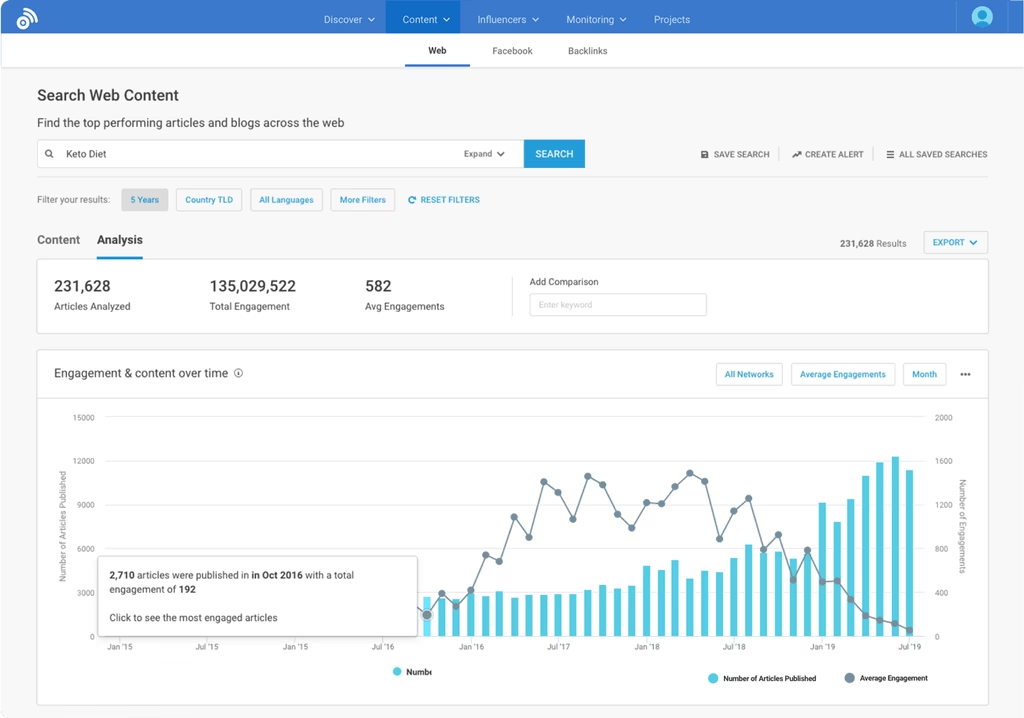
What Is BuzzSumo Best For?
BuzzSumo is best for analyzing content engagement. BuzzSumo fits content marketers, PR teams, and digital strategists who need real-time insight into what drives engagement, earns backlinks, or trends across social channels. It supports research, planning, and outreach from a single dashboard with alert and monitoring features built in.
What Are the Best Features of BuzzSumo?
The best features of BuzzSumo include verified tools for cross-channel content research, digital PR outreach, influencer targeting, and SERP trend analysis.
The best features of BuzzSumo are listed below.
- Media Database with Engagement Filters offers 700K journalist profiles, 7K outlets, and 8B articles with verified contact info and niche beat tags.
- Content Discovery uncovers viral topics, trending ideas, evergreen themes, and optimal publishing timelines.
- Content Research analyzes billions of posts to find top headlines, backlinks, content formats, and five-year engagement trends.
- The Find Influencers feature identifies journalists and creators by topic relevance, audience reach, and engagement history.
- Monitoring tool tracks brand mentions, links, and social shares in real-time with custom alerts.
An analysis of BuzzSumo’s role in content strategy, PR workflows, and media outreach is outlined in the BuzzSumo Review.
What is the Pricing Structure of BuzzSumo?
BuzzSumo starts at $199/month for the Content Creation plan, which includes 1 user, unlimited searches, and 2 alerts. The PR & Comms plan costs $299/month and adds a media database, coverage reports, and Slack integration for 5 users. The Suite plan is $499/month with 10 users, YouTube Analyzer, advanced extensions, and article uploads. The Enterprise plan costs $999/month and expands to 30 users, 50 alerts, RSS feeds, and early feature access.
6. Clearscope (Best for Content Optimization)
Clearscope is an AI-driven content optimization platform used to improve content clarity, authority, and ranking potential. Clearscope provides NLP-based keyword scoring and competitive term suggestions sourced directly from current SERPs. The tool integrates with Google Docs and WordPress to make real-time content improvement frictionless across writing environments.
What Is Clearscope Best For?
Clearscope is best for content optimization. Clearscope is great for content teams, SEO editors, and agencies who are focused on improving organic visibility through search-aligned content, term coverage, and editorial quality without second-guessing what ranks.
What Are the Best Features of Clearscope?
The best features of Clearscope involve precision content scoring and workflow-focused integrations for writers and strategists.
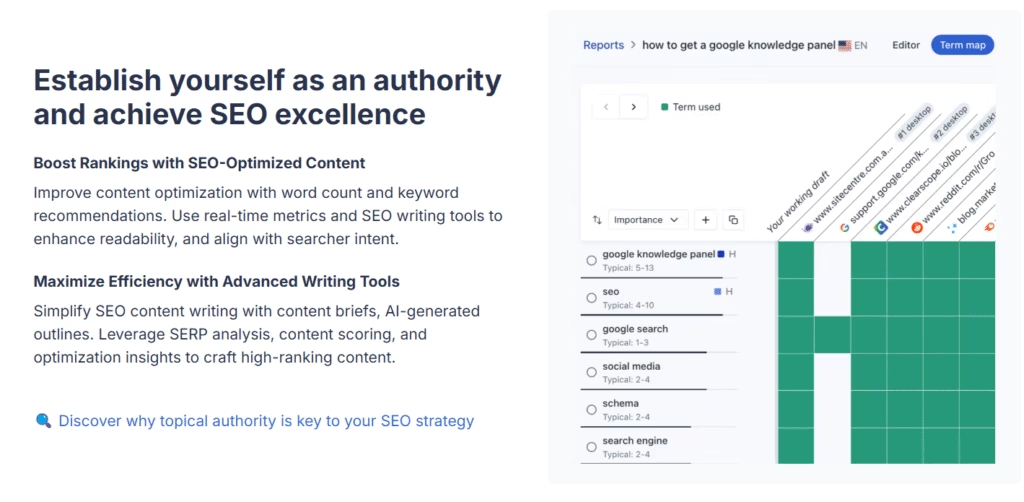
The best Clearscope features are listed below.
- Content Grade evaluates keyword inclusion, depth, and readability in real-time.
- Term Recommendations surface relevant terms based on top-ranking competitor pages.
- SERP Overview breaks down word count, content structure, and ranking domains per query.
- Outline Builder maps content flow using questions, headers, and topic segmentation.
- Google Docs Integration lets you optimize content directly inside Google Docs with in-line feedback.
- WordPress Plugin applies Clearscope’s scoring and optimization inside the block editor.
A detailed breakdown of Clearscope’s role in content optimization workflows, from brief creation to final publishing, is provided in the Clearscope Review.
What Is the Pricing Structure of Clearscope?
Clearscope pricing starts at $189/month for solo access with basic content reports. Team and enterprise pricing tiers include more seats, report credits, and advanced support. No free plan is available. Custom pricing is available on request for high-volume needs.
7. BuzzStream (Best for Link Building Outreach)
BuzzStream is a specialized SEO platform for managing high-scale link building, outreach, and digital PR campaigns. BuzzStream software centralizes contact discovery, email personalization, response tracking, and follow-up scheduling into one dashboard. Teams use BuzzStream to coordinate backlink outreach with structure, reduce manual work, and preserve prospect relationships.
What Is BuzzStream Best For?
BuzzStream is best for link-building outreach. BuzzSteam works well for SEO agencies, link builders, and PR teams running scaled outreach with custom contact lists. It works especially well for organizations that need a centralized, trackable workflow for link placement, influencer pitching, or earned media coverage.
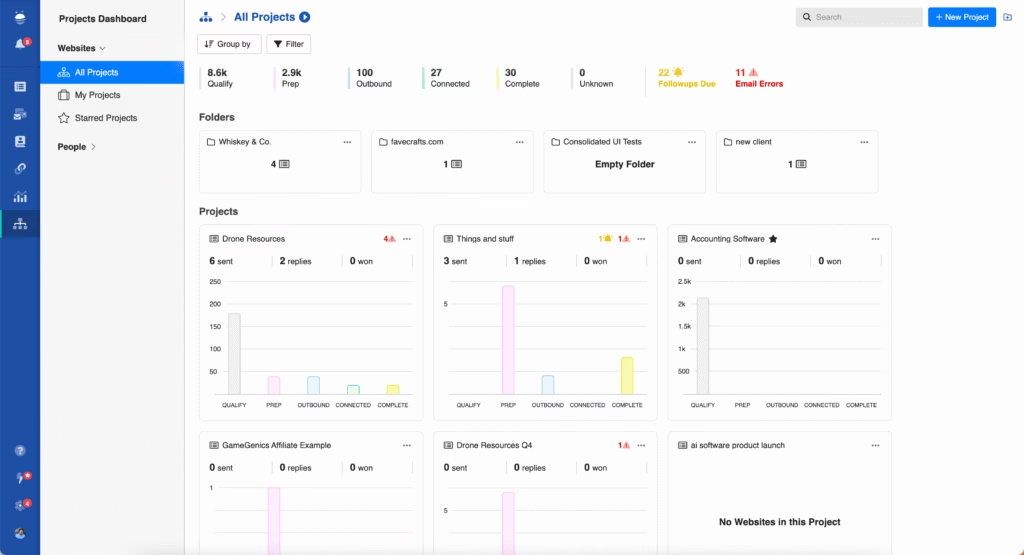
What Are the Best Features of BuzzStream?
The best features of BuzzStream support targeted link acquisition campaigns with integrated research, outreach, and follow-up workflows.
The best features of BuzzStream are below.
- Discovery Tool finds influencers and bloggers by topic, filters by authority metrics, and builds qualified lists.
- BuzzMarker Extension pulls contact info, links, and social profiles directly from web pages during prospecting.
- Outreach Sequences send automated follow-ups based on triggers or delays, increasing placement rates with less manual work.
- Email Templates insert dynamic fields (e.g., name, site, title) and track opens, clicks, and response rates across variations.
- Campaign Management groups outreach efforts by project, assigns tasks, and keeps teams aligned in one workspace.
- Link Monitoring checks for acquired backlinks and updates every 2 weeks to avoid redundant outreach or missed placements.
How BuzzStream operationalizes link building and manages PR processes across campaigns is detailed in the BuzzStream Review.
What Is the Pricing Structure of BuzzStream?
BuzzStream offers a 14-day free trial across all plans. BuzzStream pricing starts with the Starter Plan at $24/month for one user and up to 1,000 contacts. The Growth Plan costs $124/month for three users and 25,000 contacts. The Professional Plan is $299/month for six users and 100,000 contacts. The Custom Plan starts at $999/month for teams of 15+ users and up to 300,000 contacts.
8. Writesonic (Best for AI Content Writing)
Writesonic is an AI-powered SEO and content automation platform for teams that need to create, optimize, and publish across multiple channels. Writesonic integrates search data, AI writing agents, and optimization workflows into a single workspace. The platform supports real-time research, branded content creation, internal linking, and one-click publishing with CMS integrations.
What Is Writesonic Best For?
Writesonic is best for AI content writing. Writsonic supports marketers, freelancers, and SEO teams that manage high-volume content creation across different formats and languages. Its workflow tools reduce manual effort and preserve consistency in tone, style, and optimization.
What Are the Best Features of Writesonic?
The best features of Writesonic are the integrated AI agents and content optimization tools for search performance, brand voice, and automation. Its built-in agents reduce time spent switching between tools and centralize workflows across blog writing, ecommerce, and performance content.
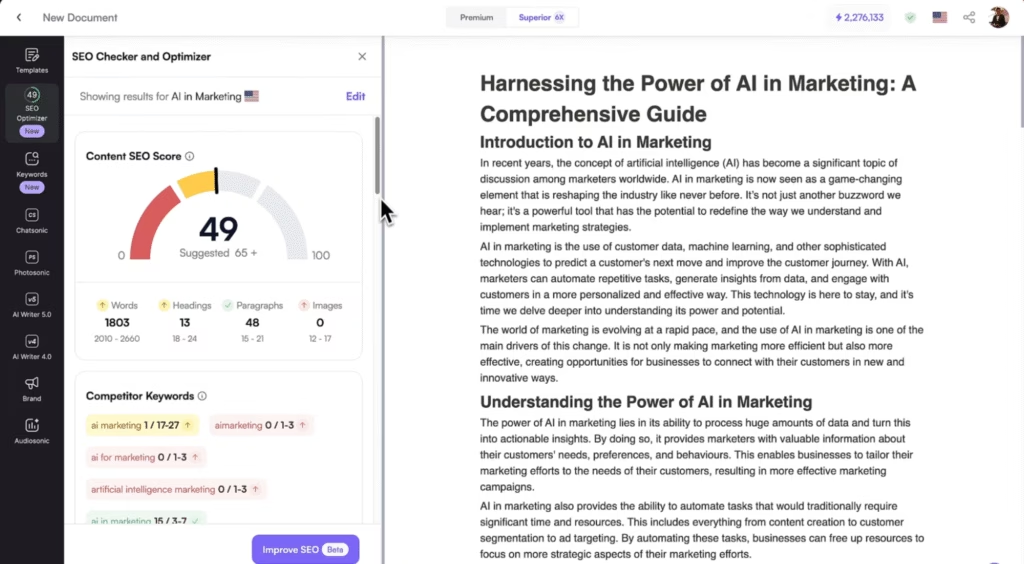
The best features of Writesonic are listed below.
- AI Article Writer generates SEO-optimized articles with internal linking, fact-checking, and long-form formatting.
- Chatsonic AI is a conversational AI chatbot trained on live data to draft, edit, and refine content faster.
- Botsonic Builder deploys custom website chatbots using drag-and-drop logic for lead capture and automated support.
- Generative Engine Optimization (GEO) analyzes and optimizes content for search engine and AI chatbot visibility using cross-channel data.
- Brand Voice Customization lets you match content tone and language using brand training and style presets.
- Topic Explorer researches trending keywords, questions, and competitor strategies using real-time integrations.
- Multilingual Support lets you create content in multiple languages for global SEO and localized targeting.
- End-to-End Publishing pushes content live to CMS platforms or social channels from a single dashboard.
A complete assessment of Writesonic’s AI content systems and performance-based publishing features is included in the Writesonic Review.
What Is the Pricing Structure of Writesonic?
Writesonic includes a free trial with access to one article, one project, and basic AI generations. The Lite plan costs $39/month and includes 15 articles, six audits, and limited brand styles. The Standard plan is $79/month and adds GSC integration, unlimited generations, and enhanced styling options. The Professional plan is $199/month with 100 articles, 40 audits, and access to the Topic Explorer. The Advanced plan is $399/month and supports five users with expanded capacity for large teams.
9. Whitespark (Best for Citation Building)
Whitespark is a local SEO platform built to improve citation authority, map pack visibility, and GBP performance. Whitespark identifies where listings fall short, tracks neighborhood-level rankings, and manages review campaigns for service-area businesses. Its tools help local teams fix inconsistencies, expand presence across location-based directories, and compete for proximity-based searches.
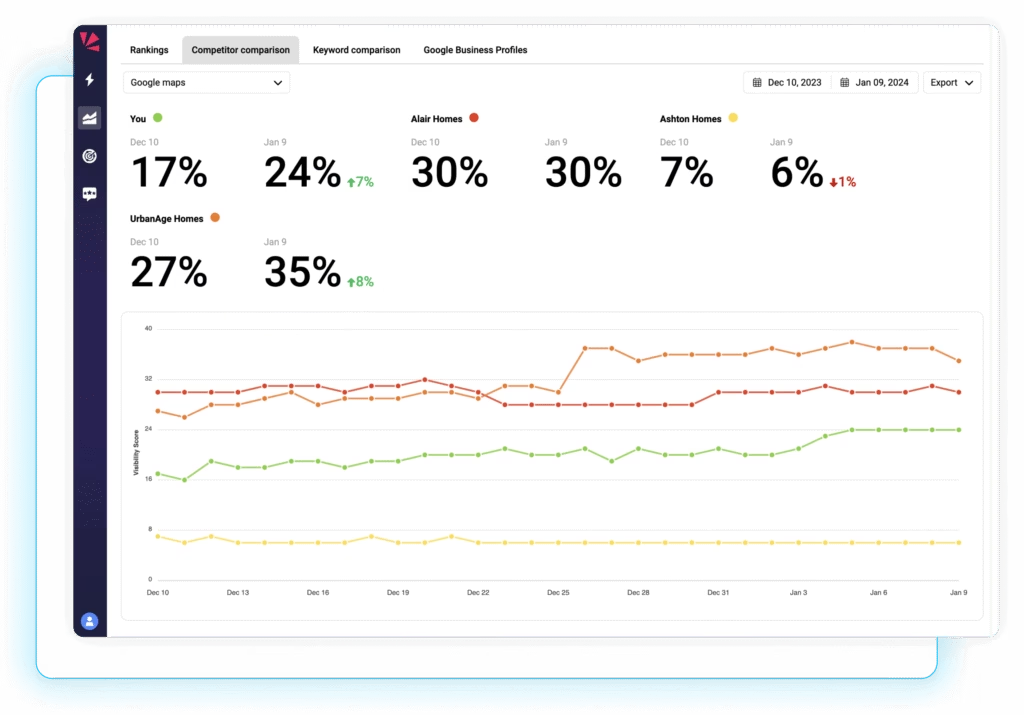
What is Whitespark Best For?
Whitespark is best for citation building. Whitespark is ideal for local SEO agencies, franchises, and SMBs (Small and Medium-Sized Businesses) targeting Google Maps rankings in service areas. It works well for teams that manage hundreds of citations, need localized SERP snapshots, or run white-label listing campaigns with branded assets.
What Are the Best Features of Whitespark?
The best features of Whitespark are the location-first SEO tools that prioritize listing accuracy, review signals, and proximity-based tracking.
The best features of Whitespark are listed below.
- Local Platform helps you manage Google Business Profiles by blocking unwanted updates and enabling bulk location edits.
- Local Rank Tracker tracks keyword rankings at the city or zip code level to monitor local visibility changes.
- Local Citation Finder discovers high-authority citation sources and monitors your current listings to spot gaps.
- Reputation Builder automates review requests and helps collect customer feedback to improve online ratings.
- Listings Service allows you to launch citation campaigns or clean up inconsistent listings using Whitespark’s in-house fulfillment team.
- Yext Replacement Service provides a more cost-effective way to maintain citation consistency without long-term contracts.
- Enterprise Services support multi-location SEO at scale through customized workflows, white-label options, and hands-on support.
A deeper exploration of how Whitespark supports local listing management, rank tracking, and enterprise SEO is available in the Whitespark Review.
What Is the Pricing Structure of Whitespark?
Whitespark tools are priced separately. The Local Platform starts at $1/month per location, offering GBP syncing and management tools. The Local Rank Tracker starts at $14/month and scales by keywords and locations. The Local Citation Finder ranges from $33 to $149/month, depending on the tracking and discovery tier. The Reputation Builder costs $79/month per location, with automation features included.
10. Semrush (Best for Keyword Research)
Semrush is an advanced, premium SEO platform that specializes in competitive keyword research intelligence at scale. Semrush’s core strength is identifying, analyzing, and organizing keywords for organic, paid, and PLA (Product Listing Ads) channels, and connecting that to SERP behavior, traffic value, and ranking volatility across domains.
Semrush offers cross-channel search visibility data that reveals where, why, and how competitors win traffic. Cross-channel search visibility data includes deep insights into PPC spend vs. SEO performance, keyword-level revenue estimation, and content strategy by intent cluster.
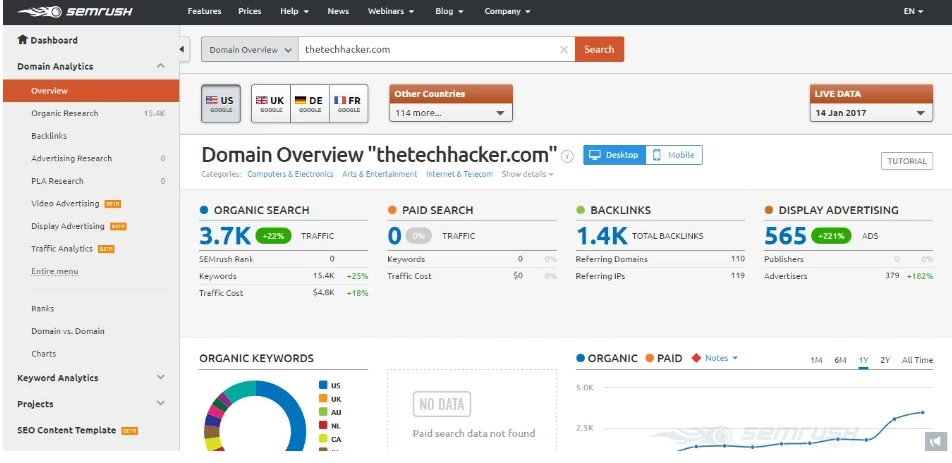
What Is Semrush Best For?
Semrush is best for keyword research. Semrush is a great resource for advanced SEO strategists, PPC professionals, and in-house content teams that need to extract competitor keyword data, quantify traffic value, and map ranking patterns across organic, paid, and shopping channels. It excels in building multi-channel keyword strategies backed by historical trend data, intent segmentation, and domain-level opportunity analysis.
What Are the Best Features of Semrush?
The best features of Semrush cover keyword intelligence, competitor tracking, backlink auditing, technical optimization, and content strategy.
The best features of Semrush are listed below.
- Keyword Overview analyzes organic and paid difficulty, CPC data, intent, and real-time SERP features by keyword.
- Keyword Magic Tool generates expansive keyword clusters from a 26 B+ database with filters for match type, intent, and topic.
- Keyword Gap compares up to five competitor domains to reveal missed terms and untapped keyword themes.
- Backlink Analytics uncovers referring domains, anchor text distribution, link velocity, and toxic signals.
- On-Page SEO Audit diagnoses Core Web Vitals, metadata issues, cannibalization, and crawl errors.
- Topic Research Tool surfaces high-traffic topics with subheading ideas, question queries, and intent-based clusters.
- Position Tracking tracks rankings daily across devices, zip codes, and local packs with visibility score changes.
Semrush’s core features support end-to-end SEO workflows from strategy to execution. For a detailed evaluation of functionality across SEO use cases, see the Semrush Review.
What Is the Pricing Structure of Semrush?
Semrush offers three main plans. The Pro Plan costs $139.95/month and includes 5 projects, 500 keywords, and 10,000 results per report. The Guru Plan costs $249.95/month and includes 15 projects, 1,500 keywords, content templates, and Looker Studio integration. The Business Plan costs $499.95/month and includes 40 projects, 5,000 keywords, API access, Share of Voice, and custom limits. A limited free plan and a 14-day trial are available.
11. Ahrefs (Best for Backlink Analysis)
Ahrefs is one of the top SEO platforms for backlink analysis, rank tracking, and competitive research. Ahrefs has one of the largest third-party link databases and offers precise keyword metrics across multiple search engines.
What Is Ahrefs Best For?
Ahrefs is best for backlink analysis. Ahrefs suits SEO professionals and digital agencies who focus on studying competitor domains and uncovering backlink opportunities.
Ahrefs SEO platform supports complex domains, multi-project tracking, and ongoing SERP monitoring with high data accuracy.
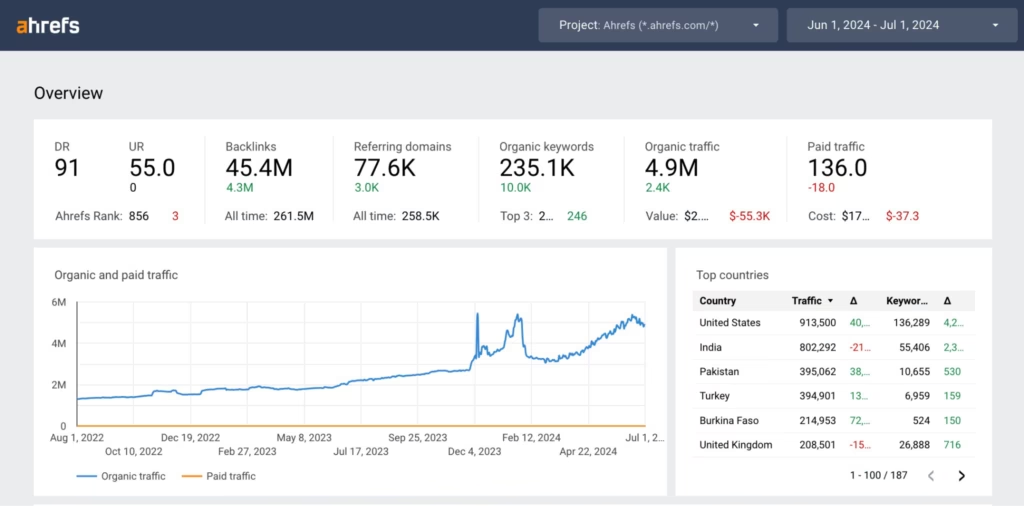
What Are the Best Features of Ahrefs?
The best features of Ahrefs are advanced SEO tools tailored for link intelligence, technical audits, keyword strategy, and competitor research.
The best features of Ahrefs are listed below.
- Site Explorer reveals backlink sources, anchor text distribution, top-performing content, and traffic value by URL.
- Keywords Explorer analyzes search volume, parent topic clusters, ranking difficulty, and intent modifiers across Google, Bing, YouTube, Amazon, and more.
- Content Gap Tool compares up to 10 domains to identify missing keyword coverage and untapped topic clusters.
- Site Audit Tool runs comprehensive crawls to surface Core Web Vitals issues, orphaned pages, thin content, and internal link imbalances.
- Content Explorer lets you search indexed pages by topic to find high-performing content based on links, shares, and traffic.
A detailed evaluation of how Ahrefs tools perform in applied SEO workflows is covered in the Ahrefs Review, including feature depth, index quality, and competitive positioning.
What Is the Pricing Structure of Ahrefs?
Ahrefs Starter costs $29/month with limited features. Lite starts at $129/month for 5 projects and 750 tracked keywords. Standard and Advanced plans scale project count, keyword capacity, and crawl limits. Enterprise pricing begins at $1,499/month with custom access tiers.
12. AgencyAnalytics (Best for SEO Reporting)
AgencyAnalytics is a reporting automation software designed for marketing agencies that manage multi-channel campaigns at scale. AgencyAnalytics consolidates SEO, PPC, social, email, and web analytics into customizable, white-labeled dashboards and client-facing reports.
What is AgencyAnalytics Best For?
AgencyAnalytics is best for SEO reporting. AgencyAnalytics offers solutions for SEO and digital marketing agencies that need to automate client reporting, reduce manual data collection, and present real-time performance insights across 80+ marketing platforms. It’s valuable for account managers handling high-volume accounts or large teams.
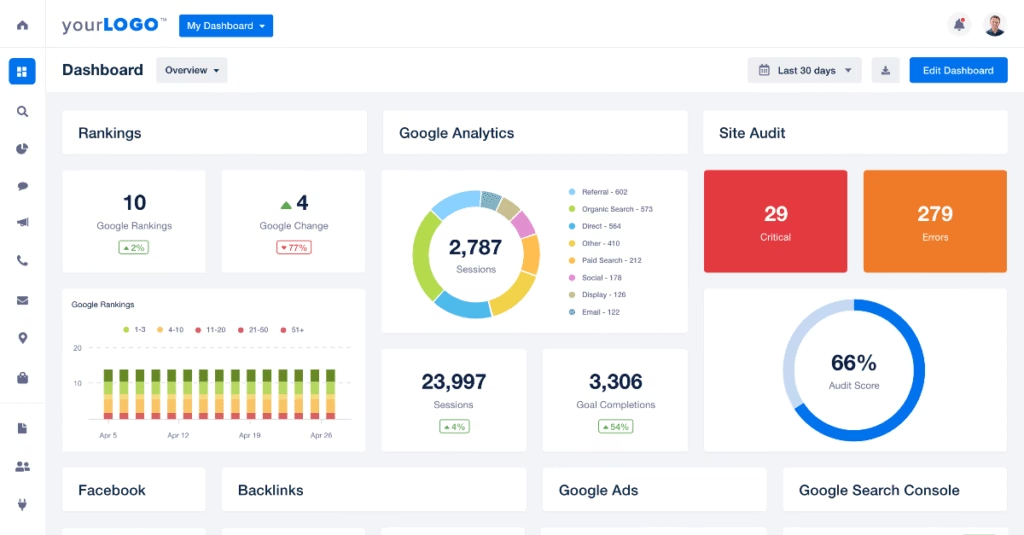
What Are the Best Features of AgencyAnalytics?
The best features of AgencyAnalytics include a full reporting suite for SEO, PPC, and agency workflows. The best features of AgencyAnalytics are listed below.
- SEO Tools Suite tracks keyword rankings, performs site audits, monitors backlinks, and schedules automated SEO reports.
- White Label Dashboards let agencies add custom branding, host reports on their own domain, and send emails from custom addresses.
- Client Reporting Automation builds scheduled, drag-and-drop reports with goal tracking, annotations, and multi-client data support.
- AI Reporting Tools generate instant insights and recommendations using Ask AI and Summary AI from connected campaign data.
- Custom Metrics and Filters allow formula-based reporting across platforms with flexible filters for channel-specific or campaign-level performance.
- Team and Client Management provides separate logins, role-based permissions, and internal task tracking across projects.
Understanding how multi-channel reporting and client operations perform in practice helps evaluate the tool’s fit for specific SEO priorities. More details are available in the AgencyAnalytics Review.
What Is the Pricing Structure of AgencyAnalytics?
AgencyAnalytics starts at $79/month for 5 clients with unlimited reports and 80+ integrations. The $239/month Agency plan adds full branding, AI tools, and custom metrics. Agency Pro costs $479/month and includes forecasting, benchmarks, and priority support. Each extra client is $20/month. A 14-day free trial is available.
13. AccuRanker (Best for Rank Tracking)
AccuRanker is a high-speed, enterprise-grade SEO rank tracking tool that delivers precise keyword position data from Google, Bing, YouTube, and Baidu. AccuRanker supports large-scale SEO operations with daily updates, on-demand refreshes, and local, national, and global tracking for desktop and mobile.
What is AccuRanker Best For?
AccuRanker is best for rank tracking. The tool is suited for SEO agencies and enterprise marketers that manage large keyword sets across locations, languages, and search engines.
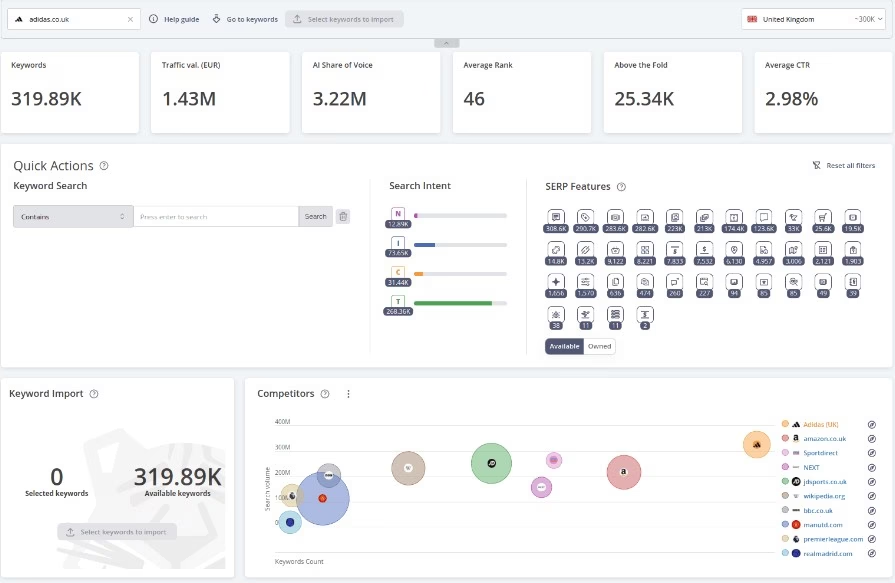
AccuRanker is ideal for operations that demand dynamic tagging, CTR modeling, pixel tracking, and real-time competitor monitoring across multiple devices and geographies.
What Are the Best Features of AccuRanker?
The best features of AccuRanker are the segmentation engine, SERP feature monitoring, and Share of Voice metrics that help teams analyze performance at every level (page, keyword, or market segment).
The best features of AccuRanker are below..
- Rank Tracker monitors keyword rankings daily or instantly by device, location, and search engine.
- Site Explorer visualizes keyword distribution and page-level visibility over time.
- Dynamic Tagging & Segments apply advanced filters to isolate high-value keyword groups and performance trends.
- SERP Feature Monitoring tracks ownership and historical trends of features like snippets, carousels, and local packs.
- Share of Voice feature helps estimate market share with AI-based CTR and visibility metrics for positions 1-20.
- API & Integrations pull data into Looker Studio, Google Sheets, GSC, or custom dashboards using REST API.
A full breakdown of how AccuRanker supports precision rank tracking and enterprise segmentation is highlighted in the AccuRanker Review.
What Is The Pricing Structure of AccuRanker?
AccuRanker pricing starts at $129/month for 1,000 keywords, with all features included. Plans scale with usage as it follows $609/month for 5,000 keywords, $849/month for 10,000, $1,569/month for 25,000, and $2,769/month for 50,000. All plans include API access, daily updates, mobile/desktop tracking, and unlimited users.
14. Moz Local (Best for Local SEO Management)
Moz Local is a local SEO tool that helps businesses maintain accurate listings, monitor reviews, and improve local visibility across Google, Facebook, Apple Maps, and top-tier directories. Moz Local automates listing distribution, suppresses duplicates, and tracks location-based engagement metrics.
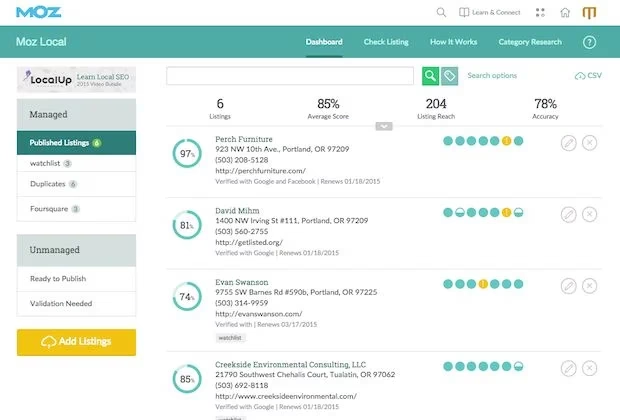
What Is Moz Local Best For?
Moz Local is the best local SEO management for multi-location businesses, brick-and-mortar retailers, and service-based companies that need consistent NAP data and unified review management across platforms.
What Are the Best Features of Moz Local?
The best features of Moz Local include sentiment monitoring, competitor comparison tools, and automated listing sync tailored for location-based SEO.
The best features of Moz Local are listed below.
- GeoRank Tracker tracks keyword rankings by zip code or city to measure visibility and spot regional gaps.
- Competitor Insights benchmarks local performance across search and engagement metrics to find growth opportunities.
- Review Management collects and responds to feedback using AI-assisted templates from platforms like Google and Yelp.
- Social Media Integration connects Google, Facebook, and Instagram profiles to track consistency and user interaction.
- Auto-sync Listings updates business info across directories to prevent inconsistencies and listing dilution.
- Engagement Monitoring surfaces real-time customer activity, including reviews, messages, and click actions.
Find a detailed evaluation of how Moz Local manages listings, visibility, and local reputation signals in the Moz Local Review.
What Is the Pricing Structure of Moz Local?
Moz Local pricing starts at $16/month per location for the Lite plan, which includes listing management and review monitoring. The Preferred plan is $24/month and adds analytics and enhanced reporting. The Elite plan costs $33/month and includes full review management, analytics, and social media integrations.
15. Alli AI (Best for SEO Automation)
Alli AI is an SEO automation platform built to deploy and manage large-scale on-page changes across any CMS. Alli AI works through a JavaScript snippet that lets users edit and optimize site content, tags, internal links, and structure directly from a single dashboard, without dev knowledge.
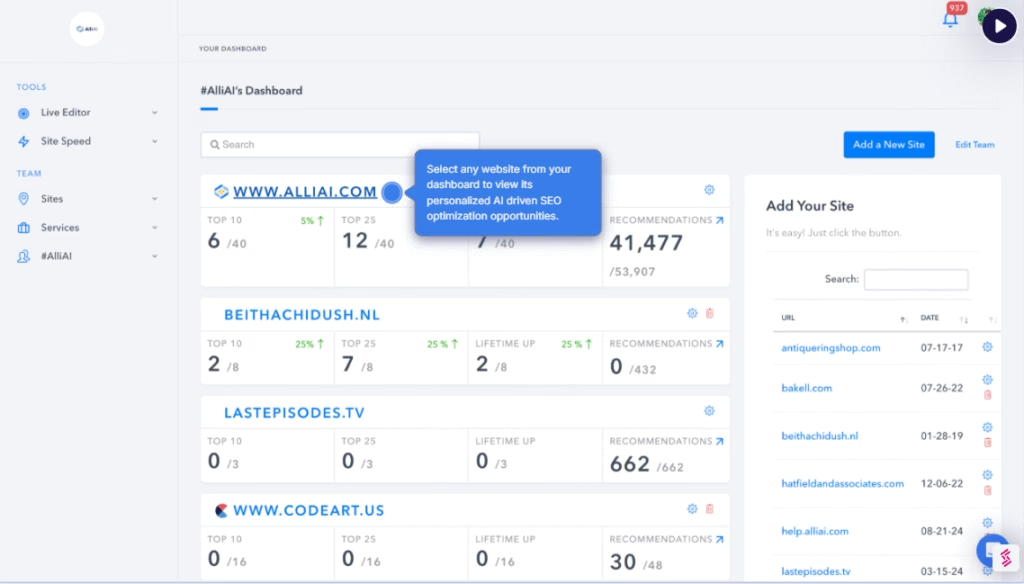
What is Alli AI Best For?
Alli AI is best for SEO automation for agencies, multi-site operators, and teams that need to implement SEO changes rapidly across large site portfolios without waiting for development cycles.
What Are the Best Features of Alli AI?
The best features of Alli AI provide instant on-page editing, internal linking automation, and AI-driven optimization recommendations for faster implementation. The best features of Alli AI are listed below.
- Live On-Page Editor updates titles, meta tags, content, and links instantly from the browser.
- Bulk Automation Rules deploy SEO changes across thousands of pages using customizable logic.
- Dynamic Tagging Engine groups pages based on content, URL, or keyword criteria for targeted changes.
- CMS-Agnostic Deployment applies edits through JavaScript, supporting WordPress, Shopify, and any HTML-based framework.
- AI Optimization Recommendations suggest sitewide fixes, prioritized by impact.
- Instant Highlight Tool verifies all deployed changes in real time across every page.
A complete examination of how Alli AI accelerates SEO execution and scales optimization across frameworks is included in the Alli AI Review.
What Is the Pricing Structure of Alli AI?
Alli AI pricing starts at $169/month for the Small Biz plan, which includes 1 site, 1 team member, 100 keywords, 250 pages, weekly crawls, link builder, and speed optimization. The Consultant plan costs $399/month for 5 sites and adds daily crawls, live editor, and local tracking. The Agency plan at $699/month supports 15 sites and unlocks API access, AI agents, and customer success. Enterprise plans begin at $1,249/month for 50 sites and include white-labeling and priority support for high-scale operations.
16. SpyFu (Best for Competitor Analysis)
SpyFu is an SEO competitive intelligence platform built to reverse engineer competitor strategies. SpyFu reveals every keyword a domain has ranked for or bid on in the past 18 years, alongside full ad copy, campaign history, and backlink data.
What Is SpyFu Best For?
SpyFu is best for competitor analysis for SEO and PPC marketers who want to uncover winning strategies by mapping out ranking gaps, paid search performance, and link-building opportunities in any niche.
What Are the Best Features of SpyFu?
The best features of SpyFu are below.
- Competitor Keyword Research lets you see all organic and paid keywords competitors rank or bid on, complete with traffic estimates.
- Ad History and Split Tests review every Google Ads campaign and ad test your rivals have run, with performance insights.
- Backlink Outreach helps you find backlink sources that help competitors rank and use contact info to pitch your content.
- Keyword Gap Finder identifies SEO and PPC keywords that competitors target and you don’t.
- Custom Branded Reports allows you to create client-ready reports showing rankings, keyword opportunities, and competitor activity.
- RivalFlow AI is an AI-powered feature that finds SEO content gaps and generates optimized articles to close them.
An overview of how SpyFu supports SEO and PPC strategies through competitive data and automation is included in the SpyFu Review.
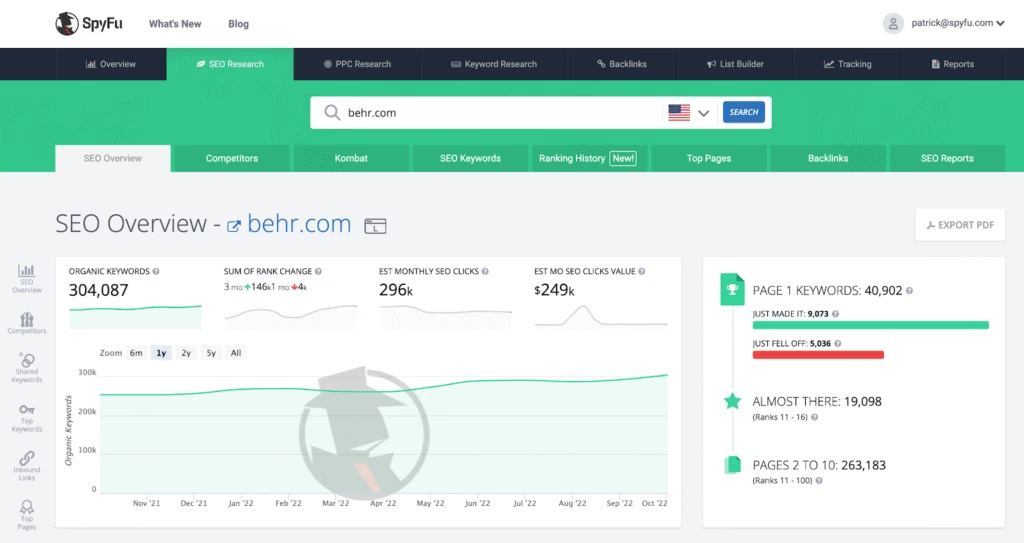
Pricing
SpyFu starts at $39/month for unlimited searches and downloads. All plans include keyword research, rank tracking, backlink data, and PPC analysis. Higher tiers unlock API access and advanced reporting, with a 30-day money-back guarantee and no contracts.
17. Google Search Console (Best for Monitoring Site Performance)
Google Search Console (GSC) is Google’s official platform for tracking how your website appears and performs in Google Search. GSC provides direct data on indexing status, keyword visibility, search appearance, and technical issues that affect rankings. Unlike third-party tools, GSC shows exactly how Googlebot sees and processes your site. It is the most trusted source for diagnosing SEO performance.
What is Google Search Console Best For?
Google Search Console is best for monitoring organic search performance and identifying technical issues. GSC is a must for SEOs, developers, and site owners who want to understand index coverage, keyword impressions, click-through rates, and crawl errors straight from Google.

What Are the Best Features of Google Search Console?
The best features of Google Search Console provide direct insights into organic performance, indexing status, and search visibility based on live Google data.
The best Google Search Console features are listed below.
- Performance Reports show impressions, clicks, average position, and CTR for keywords and pages in Google Search.
- Index Coverage flags crawl errors, noindexed pages, and canonical conflicts that block visibility.
- Page Experience evaluates Core Web Vitals, HTTPS status, and mobile usability metrics.
- URL Inspection Tool tests individual pages for indexing status, canonical URLs, and live crawlability.
- Sitemaps submission ensures Google can discover and prioritize the right URLs.
- Manual Actions and Security Issues notify users of penalties, spam, or malware detected by Google systems.
These features expose how Google views, crawls, and ranks a site across indexing, experience, and query-level performance. The Google Search Console Review covers how each function contributes to technical audits, visibility tracking, and issue resolution.
What Is the Pricing Structure of Google Search Console?
Google Search Console is completely free and available to all verified site owners and SEO professionals.
18. AnswerThePublic (Best to Reveal Search Intent)
AnswerThePublic is a keyword visualization and search listening tool that reveals the questions, comparisons, and related terms users search for around any topic. AnswerThePublic transforms autocomplete data from Google, Bing, TikTok, Amazon, and Instagram. It helps marketers uncover long-tail keywords and structure content for SEO and AEO (Answer Engine Optimization).
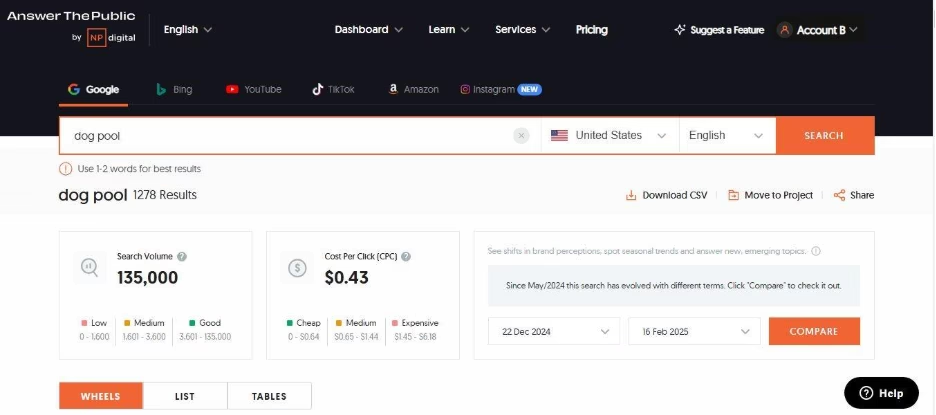
What is AnswerThePublic Best For?
AnswerThePublic is best for revealing search intent. It’s especially useful for content creators, SEOs, and marketers who want to explore what real users are asking, across questions, prepositions, PAA (People Also Ask) sections, and comparisons, to drive idea generation and align content with demands.
What Are the Best Features of AnswerThePublic?
The best features of AnswerThePublic organize autocomplete suggestions into intuitive formats for easy topic exploration.
The most useful features of AnswerThePublic are listed below.
- Question Graphs visualize search queries using who, what, when, where, why, and how formats.
- Prepositions and Comparisons highlight queries with modifiers like “for,” “with,” “vs,” and “like” to uncover use cases and alternatives.
- Alphabetical Keyword Lists expand coverage with A-Z autocomplete phrases.
- Search Listening Alerts send monthly trend updates on rising or declining keyword themes.
- Data Export Options let users download keyword lists in CSV format for deeper analysis or clustering workflows.
AnswerThePublic’s structured output helps content strategists translate user curiosity into actionable keyword opportunities. The AnswerThePublic Review explains how these features support topic ideation and intent mapping.
What Is the Pricing Structure of AnswerThePublic?
AnswerThePublic offers flexible plans with a 7-day free trial and a one-time lifetime deal. The Individual plan costs $5/month for one user with 100 daily searches. The Pro plan at $49/month supports up to 3 users and includes unlimited searches. The Expert plan costs $99/month, supports unlimited users, and is designed for agencies and brand monitoring.
19. Moz (Best for Monitoring Domain Authority)
Moz is a long-standing SEO platform focused on tracking organic performance through domain-level metrics, keyword monitoring, and technical audits. Moz offers a structured way to monitor domain-level performance, which makes it easier to evaluate digital presence, track authority growth, and benchmark against competitors.
At the core of Moz is Domain Authority (DA), a proprietary score that estimates a website’s ability to rank in search results. Whether you’re vetting backlink prospects, assessing client domains, or scanning competitors, Moz DA tools provide a snapshot of domain strength using metrics like linking root domains and inbound link quality.
What Is Moz Best For?
Moz is best for monitoring domain authority. SEOs, agencies, and digital marketers use Moz to benchmark domain strength, evaluate link profiles, and guide authority-building campaigns across large or emerging websites.
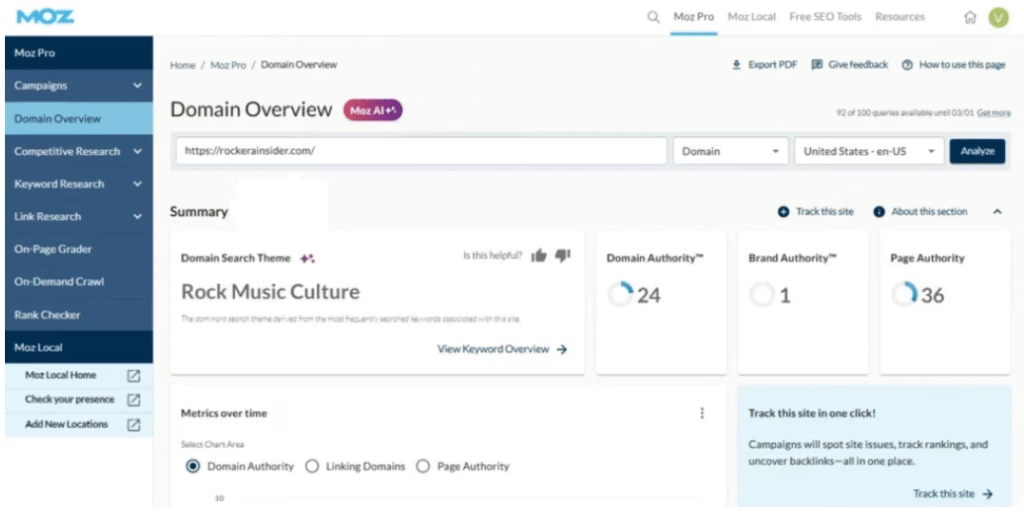
What Are the Best Features of Moz?
Moz SEO tools combine link data, keyword visibility, and site audits to create a full picture of search performance. The best features of Moz are listed below.
- Keyword Explorer delivers search volume, difficulty, and SERP preview for over 1.25B keywords.
- Domain Overview summarizes DA, top-ranking keywords, link metrics, and site performance.
- Rank Tracking follows keyword changes over time by location and device.
- Link Explorer analyzes inbound links, anchor text, spam scores, and authority metrics.
- Site Crawl detects technical SEO issues and recommends prioritized fixes.
- MozBar provides on-page insights and DA overlays directly in the browser.
Moz tools work together to support ongoing SEO audits, competitor research, and visibility tracking. The Moz Review explains how each feature contributes to search performance analysis.
What Is the Pricing Structure of Moz?
Moz pricing begins at $39/month for the Starter plan, which includes 1 site and 50 tracked keywords. The Standard plan is $79/month with support for 3 sites and 300 keywords. The Medium plan costs $143/month with 10 sites and 1,500 keywords, while the Large plan is $239/month for 25 sites and 3,000 keywords. All plans include keyword tracking, link data, and basic site audits.
20. Local Falcon (Best for Tracking Local Rankings in GBP)
Local Falcon is a specialized local SEO rank tracker that simulates real user searches across neighborhoods, city blocks, and service areas to show how your Google Business Profile performs in hyperlocal SERPs. Local Falcon provides granular insights using geo-grid visualizations, which help businesses identify weak spots, monitor competitors, and optimize their reach on Google Maps and Apple Business Connect.
What Is Local Falcon Best For?
Local Falcon is best for tracking local rankings in Google Business Profiles for local SEOs, multi-location businesses, and agencies who need precise visibility data across physical locations. It’s ideal for understanding map pack performance, radius-based ranking gaps, and local listing opportunities.
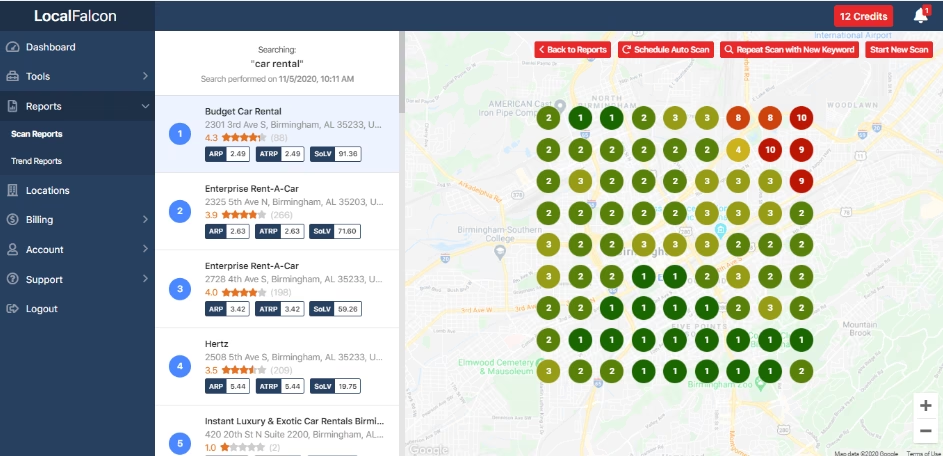
What Are the Best Features of Local Falcon?
The best features of Local Falcon focus on Google Maps visibility and review intelligence.
The best features of Local Falcon are listed below.
- Local Rank Tracking runs radius-based scans to reveal how your listing ranks across real-world locations.
- Geo-Grid Visualizations show ranking positions on color-coded heatmaps for easy interpretation of local reach.
- Falcon AI recommends optimization actions by analyzing your listing performance against nearby competitors.
- Competitor Report surfaces zone-by-zone insights into where competitors outrank you and why.
- AI Reviews Analysis summarizes customer feedback sentiment and identifies issues from Google reviews.
Local Falcon supports location-based SEO by combining geographic rank data with actionable listing insights, as outlined further in the Local Falcon Review.
What Is the Pricing Structure of Local Falcon?
Local Falcon pricing starts at $24.99/month for 90,000 credits with unlimited users and projects. Higher tiers include the Basic plan at $49.99/month (180,000 credits), Pro at $99.99/month (372,000 credits), and Premium at $199.99/month (756,000 credits). All plans include geo-grid scans, Falcon AI, and multi-user access.
21. Detailed SEO (Best SEO Chrome Extension)
Detailed SEO is a free Chrome SEO extension that instantly displays the on-page SEO architecture of any webpage. Detailed SEO is built for speed and simplicity and gives immediate access to tags, headers, schema, internal links, and metadata without inspecting the source code manually.
What Is Detailed SEO Best For?
Detailed SEO is the best Chrome extension for on-page SEO analysis for SEOs, content strategists, and technical marketers who want a fast, code-free way to audit on-page elements while browsing competitor or client sites.
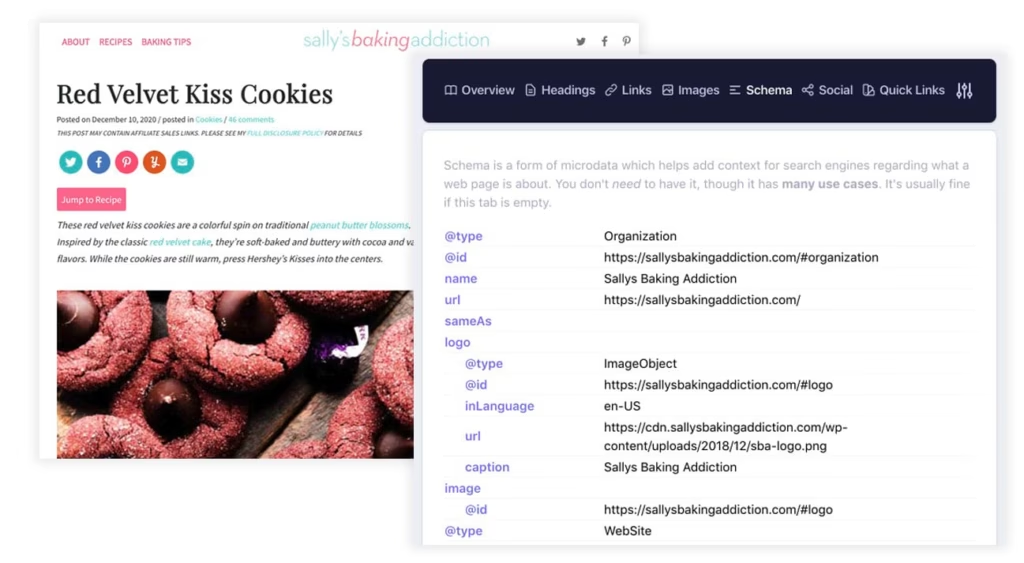
What Are the Best Features of Detailed SEO?
The best features of Detailed SEO extension surface key SEO data with one click.
The best features of Detailed SEO are below.
- Page-level Insights reveal title tags, meta descriptions, canonical tags, headers, and indexability signals in seconds.
- Duplicate Identification highlights repeated content across internal or external sources to protect content uniqueness.
- Schema Markup View displays structured data types and properties directly on-page.
- People Also Asked Extractor pulls PAA questions for keyword and content ideation.
- Outline Analysis shows H1–H6 hierarchy to confirm semantic structure and optimization depth.
See how these features assist audits, optimizations, and SERP research in the Detailed SEO Review.
What Is the Pricing Structure of Detailed SEO?
Detailed SEO is free and available as a Chrome extension. No login or subscription is required.
22. Similarweb (Best for Analyzing Web Traffic)
Similarweb is a digital intelligence platform that reveals how websites acquire, engage, and retain visitors across all major channels (search, social, direct, referrals, ads, and emerging platforms like AI chatbots). Similarweb helps teams benchmark performance, uncover traffic trends, and optimize their digital strategy based on user behavior.
What Is Similarweb Best For?
Similarweb is best for analyzing web traffic for marketers, analysts, and SEO teams who need to track digital presence, compare competitors, and prioritize acquisition strategies using real traffic data across industries and geographies.
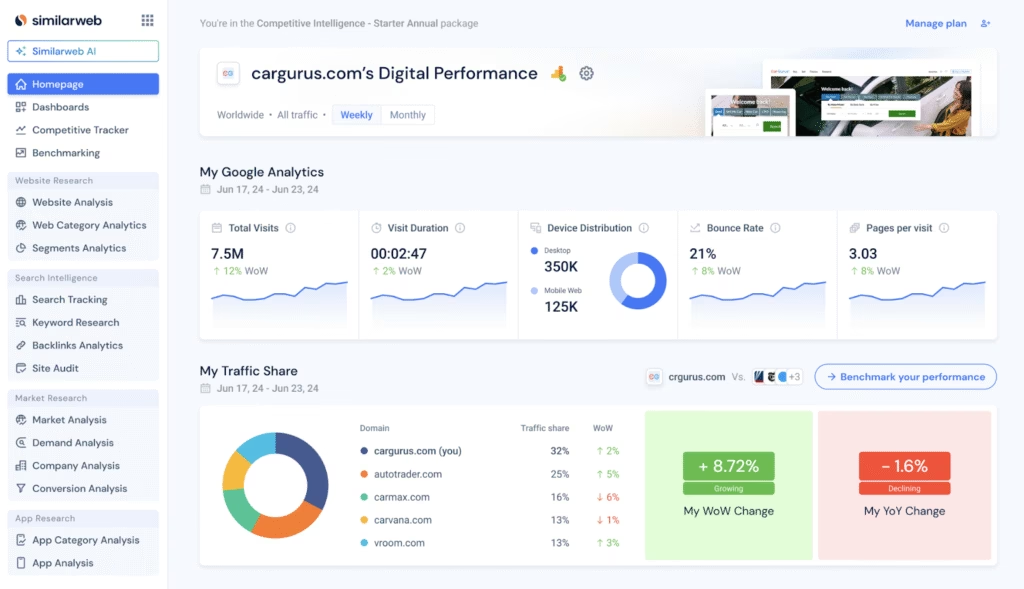
What Are the Best Features of Similarweb?
The best features of Similarweb cover the full-funnel web traffic analysis, competitive benchmarking, and emerging search channel tracking.
The best features of Similarweb are listed below.
- AI Chatbot Traffic tracks visits from tools like ChatGPT and Perplexity to monitor new traffic sources.
- Web Intelligence offers cross-domain performance data, including share of traffic by source and engagement metrics.
- Competitive Analysis compares site behavior, channels, and SERP performance to identify market gaps.
- Traffic Source Breakdown categorizes visits by channel with bounce rate, session duration, and conversion estimates.
- SERP Features Analysis shows how snippets, carousels, and other elements influence organic traffic shifts.
- Traffic Share Reports highlight the ratio of paid vs. organic traffic to uncover growth levers.
Similarweb translates raw traffic data into comparisons within markets, channels, and competitors. The Similarweb Review details how each feature supports strategic analysis and channel-level planning.
What Is the Pricing Structure of Similarweb?
Similarweb offers a Starter plan at $199/month or $1,500/year for one user, three months of data, and 1,000 keywords per table with a global view only. The Team plan costs $14,000/year and includes five users, 15 months of historical data, 50,000 keywords per table, and access to country filters, subdomain data, rank and ad tracking, and SERP analysis. The Business plan is priced at $35,000/year and expands usage to 25 months of data, 100,000 keywords per table, and includes advanced market research features and full API access.
23. Raven Tools (Best for White Label Reporting)
Raven Tools is a reporting-focused SEO platform designed for agencies and consultants that manage multi-channel marketing campaigns. Raven Tools unifies data from SEO, PPC, social, and backlink sources into branded client reports.
With built-in white-label customization, agencies can present fully personalized dashboards and reports using their logos, fonts, and color schemes. Personalization creates the appearance of proprietary tools.
What Is Raven Tools Best For?
Raven Tools is the best white label reporting SEO tool for marketers and SEO agencies that need to automate reporting and deliver client-facing insights at scale. It’s ideal for teams that prioritize visual data presentation, platform integrations, and fast report creation.
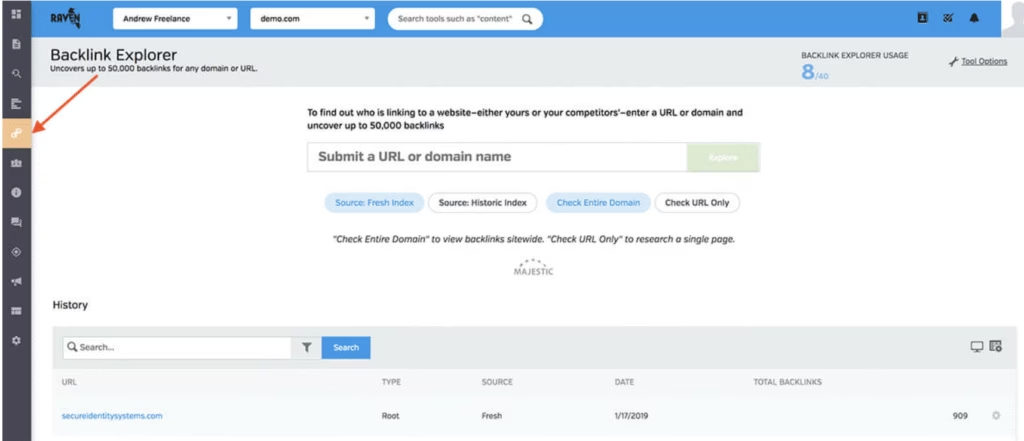
What Are the Best Features of Raven Tools?
The best features of Raven Tools simplify reporting and performance tracking with prebuilt modules, campaign monitoring tools, and client-ready formatting.
The best features of Raven Tools are listed below.
- White-labeling personalizes reports with agency-specific branding, including logos, colors, and styling.
- SEO Reports allow drag-and-drop customization for KPIs across SEO, social, and paid search.
- Keyword Rank Checker monitors daily keyword positions and tracks visibility trends across domains.
- Backlink Explorer audits link profiles, flags harmful domains, and benchmarks against competitor links.
- Site Auditor runs technical audits on desktop and mobile, generating prioritized issue lists with fix checklists.
- Enhanced Rank Tracking provides long-term trend data and filters by location, device, and keyword category.
Explore how Raven Tools modules, rank tracking filters, and white-labeling features support fast-turnaround reporting for agencies managing multiple campaigns in the Raven Tools Review.
What Is the Pricing Structure of Raven Tools?
Raven Tools pricing starts with the Small Biz plan at $39/month for 2 campaigns, 2 users, and 1,500 position checks. The Start plan is $79/month with 20 campaigns, 4 users, and 15,000 checks. The Grow plan offers 80 campaigns and 20,000 checks for $139/month. The Thrive plan increases to 160 campaigns and 25,000 checks for $249/month, while the Lead plan supports 320 campaigns, 40 users, and 30,000 checks at $399/month.
24. Google Analytics 4 (Best for User Engagement Analysis)
Google Analytics 4 (GA4) is Google’s next-generation analytics platform designed to track user behavior across websites and apps in a privacy-conscious, event-based framework. Unlike Universal Analytics, GA4 focuses on engagement metrics instead of pageviews, which offers a fuller picture of how users interact with digital properties across devices and sessions.
What Is Google Analytics 4 Best For?
Google Analytics 4 is best for user engagement analysis. GA4 is a must-use for marketers, analysts, and product teams who need deeper insight into how users engage with content, convert across funnels, and move through customer journeys.
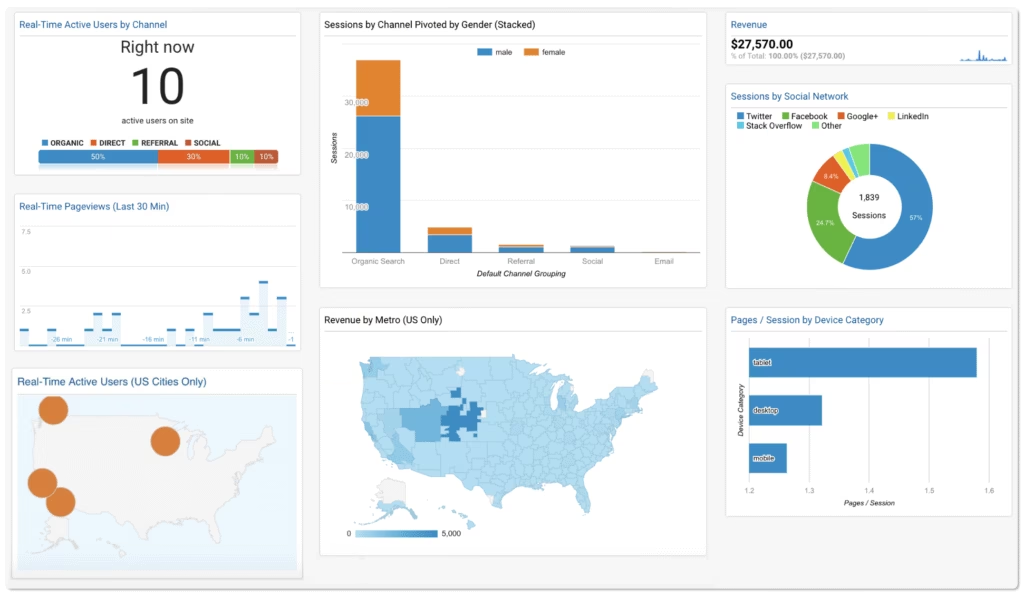
It’s particularly suited for businesses that want unified tracking for web and app data while preparing for a cookieless future.
What Are the Best Features of Google Analytics 4?
The best features of Google Analytics 4 offers ntegrated data and engagement metrics that help marketers optimize performance, user journeys, and monetization.
The best features of GA4 are below.
- Event-Based Analytics tracks granular user actions like clicks, scrolls, and file downloads without relying on pageviews or sessions.
- AdSense, Google Ads, and Analytics Integration links ad performance to site behavior to evaluate monetization and engagement quality.
- Predictive Capabilities use machine learning to forecast outcomes like user churn or purchase probability based on behavioral signals.
- User Stickiness Reports analyze return frequency to identify loyal users and measure habitual engagement across sessions.
- A/B Testing Support integrates with Google Optimize to compare page variants and identify elements that improve conversion rates.
- Advertising Reports measure what users do after ad clicks, showing which campaigns lead to sales, form fills, or repeat visits.
- Search Console Integration overlays organic search rankings with on-site behavior to connect query performance with engagement.
- PageSpeed Insights Integration imports load time me§trics to reveal how speed affects bounce rates and UX indicators.
Google Analytics 4 centralizes audience behavior, ad performance, and predictive insights in one measurement layer. The Google Analytics 4 Review outlines how each feature supports decision-making across acquisition, retention, and conversion optimization.
What Is the Pricing Structure of Google Analytics 4?
Google Analytics 4 is free to use for websites and apps, and it is supported by Google. For high-traffic enterprise properties, Google Analytics 360 offers expanded data limits, BigQuery exports, and service-level support with pricing starting around $50,000/year.
25. Frase (Best for Content Creation)
Frase is an SEO content platform that simplifies how marketers research, outline, write, and optimize high-performing web pages. Frase analyzes search results in real time and identifies top-ranking content structures, allowing users to generate briefs, fill content gaps, and streamline collaboration between SEO and content teams. The interface bridges SERP analysis and drafting, making it easier to create content that aligns with searcher expectations.
What Is Frase Best For?
Frase is best for content creation for teams need to scale SEO-focused content production using real-time SERP data, reusable templates, and AI-assisted writing workflows. Frase works great for agencies and editorial teams that manage topic-driven campaigns or high-volume article delivery.
What Are the Best Features of Frase?
The best features of Frase combine content intelligence, AI writing, and SEO optimization in one workspace.
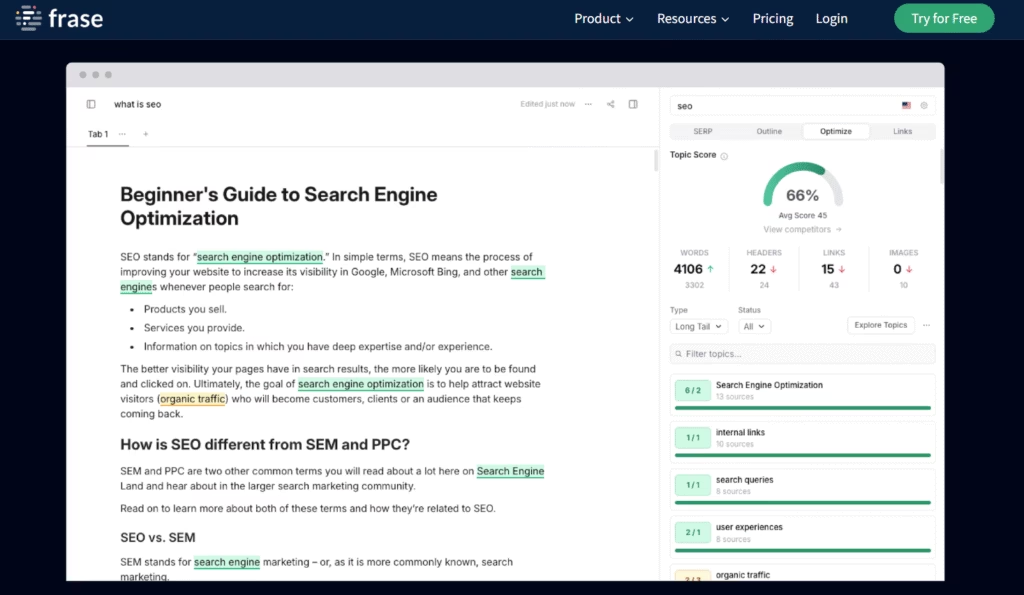
The best features of Frase are listed below.
- SERP Analyzer extracts top-ranking content themes, headers, and questions from up to 26 competitors.
- SEO Text Editor compares live drafts to competitors and highlights missing keywords or optimization gaps.
- AI Templates and SOPs standardize content workflows by saving reusable outlines, prompts, and formatting rules.
- Brief Builder creates structured outlines based on search intent, keyword clusters, and topical relevance.
- Content Optimization Engine scores keyword density, topic coverage, and relevance during editing.
- Readability Enhancer flags unclear phrasing and stylistic issues to improve language clarity and tone.
- Rank-Ready AI Docs offer optional AI-generated outlines or drafts optimized to compete with top-ranking results.
Frase aligns SERP data, AI writing, and SEO scoring into a unified content workflow. The Frase Review breaks down how each feature supports intent-focused content creation and live optimization.
What Is the Pricing Structure of Frase?
Frase pricing starts at $45/month for 1 user with 30 research documents, unlimited AI words, and site tracking. The Team plan costs $115/month for 3 users, includes unlimited documents, and allows rank-ready AI content generation. Enterprise plans are available with custom pricing, unlimited users, advanced security, and tailored onboarding.
What are SEO Tools?
SEO tools are software platforms that analyze, track, and optimize websites for higher visibility in search engine results. SEO tools support tasks related to keyword discovery, content evaluation, backlink monitoring, site performance analysis, and ranking metrics.
SEO tools help digital marketers, business owners, and SEO professionals improve their organic search performance by providing data insights, automation, and optimization recommendations.
Search engine optimization tools include both standalone applications and all-in-one platforms. Standalone SEO tools perform one specific function, such as auditing a website or analyzing backlinks. All-in-one SEO platforms integrate multiple tools into a unified interface to streamline workflows. The best online SEO tools and platforms provide real-time data from Google Search Console, keyword databases, and proprietary crawlers to support strategic decision-making.
How do SEO Tools Work?
SEO tools work by collecting, processing, and interpreting search engine data to help users improve rankings, optimize content, and fix site issues. Each SEO tool relies on different methods and data sources depending on its design, permissions, and update frequency.
Most traditional SEO software, such as Semrush and Ahrefs, uses scraping to simulate user behavior and extract keyword, backlink, and SERP data. Scraping methods depend on IP rotation, CAPTCHA handling, and proxy networks. Scraping now faces growing challenges due to Google’s JavaScript enforcement, which slows data collection and reduces accuracy. The result is delayed, sampled, or estimated data that impacts ranking and volume reliability.
Search Atlas SEO Software Platform collects data directly from verified sources like Google Search Console (GSC), which ensures that the data reflects actual user impressions, clicks, and rankings. Search Atlas integrates JavaScript-enabled browser emulation from the start, which allows the platform to load dynamic pages the same way Google sees them. The direct method prevents blocking, bypasses CAPTCHA risks, and maintains data fidelity.
What are the Types of SEO Tools?
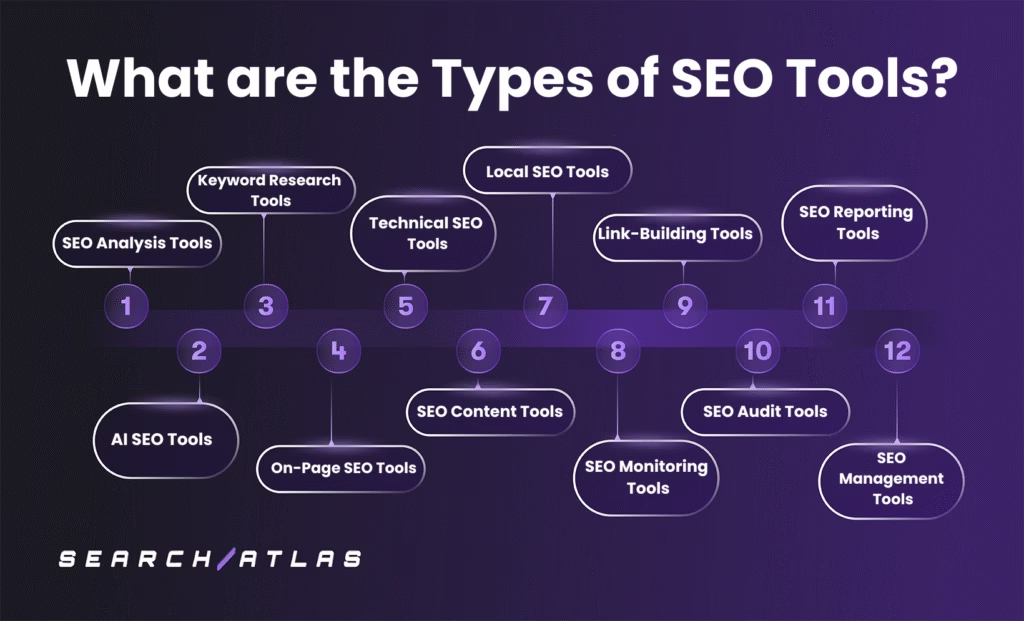
The types of SEO tools are grouped by function, use case, and campaign stage, from research and creation to tracking and reporting.
The main types of SEO tools are listed below.
- SEO Analysis Tools. SEO analysis tools evaluate keywords, pages, domains, backlinks, technical SEO, user engagement, and competitors to measure SEO performance and uncover optimization gaps. SEO analysis tools include keyword gap checkers, page-level auditors, domain comparison tools, backlink analysis tools, technical SEO analyzers, user engagement analysis, and competitor analysis platforms. The best SEO analysis tools reveal ranking signals, expose weaknesses, and support data-driven SEO strategy.
- AI SEO Tools. AI SEO tools use artificial intelligence to automate SEO tasks across keyword research, content creation, technical optimization, and strategic planning. AI SEO tools include AI keyword research tools, AI content generators, technical SEO optimizers, integration assistants, and full-stack SEO automation platforms.The best AI SEO tools like OTTO SEO streamline large-scale workflows, integrate with CMS systems, and adapt recommendations based on algorithm changes.
- Keyword Research Tools. Keyword research tools identify valuable search queries by analyzing volume, competition, intent, and SERP features. Keyword research tools include seed keyword generators, keyword gap checkers, long-tail keyword finders, SERP feature trackers, and search intent classifiers.The best keyword research tools reveal ranking opportunities, validate content ideas, and guide SEO strategy.
- On-Page SEO Tools. On-page SEO tools optimize elements within web pages to improve visibility, relevance, and indexability. On-page SEO tools assess titles, meta descriptions, headers, internal links, and HTML structure to align content with search engine requirements. On-page SEO tools include metadata editors, internal linking tools, header analyzers, and HTML structure checkers. The best on-page SEO tools streamline optimization for better SERP appearance and keyword targeting.
- Technical SEO Tools. Technical SEO tools detect site-level issues that affect crawlability, speed, and indexation. Technical SEO tools include site audit platforms, website performance tools, Page Speed tools, schema validators, and XML sitemap generators. The best technical SEO tools uncover barriers to visibility and improve site health.
- SEO Content Tools. SEO content tools support ideation, writing, and optimization based on SERP data and search intent. SEO content tools include outline generators, NLP-based topic models, AI content writers, content editors, and optimization checkers. The best SEO content tools bridge research and writing to create content that ranks.
- Local SEO Tools. Local SEO tools improve visibility in region-specific search results by managing business listings, local citations, and location-based rankings. Local SEO tools include citation builders, local rank trackers, GBP optimization tools, and review management platforms. The best local SEO tools optimize proximity, relevance, and prominence signals.
- SEO Monitoring Tools. SEO monitoring tools track keyword positions, SERP changes, and domain performance over time. SEO monitoring tools include keyword rank trackers, SERP watchers, visibility score dashboards, and performance trend analyzers. The best SEO monitoring tools help teams respond quickly to ranking shifts.
- Link-Building Tools. Link-building tools identify backlink opportunities, manage outreach, and evaluate domain-level authority. Link-building tools include backlink explorers, outreach CRMs, prospecting tools, and anchor text analyzers. The best link-building tools help scale high-quality link acquisition.
- SEO Audit Tools. SEO audit tools analyze websites for technical errors, indexation issues, content gaps, and structural weaknesses that affect rankings. SEO audit tools include crawl analyzers, site health scores, issue checklists, and audit automation systems. The best SEO audit tools provide actionable insights for optimization.
- SEO Reporting Tools. SEO reporting tools compile data from various channels into white-labeled dashboards and client-ready presentations.. SEO reporting tools include drag-and-drop report builders, KPI dashboards, PDF generators, and branding templates. The best SEO reporting tools simplify performance tracking for agencies and consultants.
- SEO Management Tools. SEO management tools centralize workflows for teams running campaigns across multiple domains, pages, and client accounts. SEO management tools include campaign managers, site trackers, team dashboards, and workflow automation systems. The best SEO management tools support scalable optimization between teams and properties.
What Businesses Need SEO Optimization Tools the Most?
Most businesses need SEO optimization tools. SEO tools help businesses attract more organic traffic by improving how their websites appear and perform in search results.
Companies that rely on digital channels for growth, leads, or online visibility benefit from SEO tools.
The 12 types of businesses that need SEO optimization tools the most are listed below.
- Digital marketing agencies. Agencies manage multiple client websites and require tools for audits, reporting, rank tracking, and performance analysis. SEO tools for agencies with white-label reporting, multi-site dashboards, and task management features support agency workflows.
- Small businesses. Small businesses often target niche audiences or local keywords. SEO tools for small businesses help find low-competition opportunities, fix on-page issues, and monitor traffic trends. Entry-level features like keyword suggestions and page grading are widely used in SEO tools for small businesses.
- Enterprise-level companies. Enterprises manage large-scale websites and face complex indexing, international SEO, and multi-domain coordination. Best enterprise SEO tools account for crawl control, technical audits, and search data monitoring across multiple teams.
- SaaS companies (B2B and B2C). SaaS companies rely on search to attract product-qualified leads, educate users, and rank for use case-specific terms. SaaS SEO tools help them optimize landing pages, compare competitor visibility, and monitor branded keywords.
- Ecommerce businesses. Ecommerce businesses or online stores use ecommerce SEO tools to improve product page visibility, optimize category structure, and drive traffic from purchase-intent queries. Shopify, WooCommerce, and Etsy sellers rely on tools that track rich results, schema markup, and long-tail keywords. Ecommerce SEO tools handle all these tasks.
- Content marketers and SEO writers. Content marketers, SEO writers, and editors use SEO tools to structure articles, target semantic keywords, and measure topical coverage. Content marketing tools with content-focused features like NLP scoring, internal linking suggestions, and keyword clustering support writing workflows.
- Affiliate marketers. Affiliate marketers depend on organic traffic to generate commission-based revenue. Affiliate marketers use affiliate SEO tools to find low-competition keywords, track SERP changes, and optimize content for conversions. This segment benefits from tools focused on content scoring, CTR analysis, and rank tracking.
- Local service providers. Local businesses like plumbers, electricians, or realtors use SEO tools to improve visibility for “near me” searches and optimize Google Business listings. Local SEO tools with local rank tracking and location-based keyword clustering are particularly relevant here.
- Publishers and media sites. Publishers and media sites need SEO tools to cover trending topics, manage large content archives, and optimize headlines for search. Online publications rely on SEO tools with content performance metrics, crawl budget management, and structured data testing.
- Educational platforms. EdTech platforms, online course providers, and training centers use SEO tools to reach students through search. These businesses need tools that help them rank for course-related keywords, improve content relevance, and monitor informational intent.
- Freelancers and consultants. Freelance SEOs and independent consultants often work across multiple sites or niches. They use flexible, multi-account SEO tools with audit functions, keyword planning, and white-label reporting. A white label SEO tool with no seat limits and scalable pricing work best here.
- Nonprofits and NGOs. Nonprofits and NGOs, as mission-driven organizations, use SEO to reach donors, volunteers, and communities. They benefit from SEO tools that improve informational content, enhance local visibility, and optimize donation or campaign pages.
What Makes the Best SEO Tool?
The best SEO tool is a software platform that combines data accuracy, workflow automation, and full-stack SEO optimization features in one system. An SEO tool becomes the best option when it helps users improve rankings through precise insights, AI-enhanced recommendations, and usability across technical, on-page, and content SEO.
To choose the best SEO tool, follow the 7 steps listed below.
- Check the SEO functions. Confirm that the SEO tool supports keyword research, site audits, backlink analysis, and rank tracking in one platform.
- Evaluate data freshness. Prioritize tools that use real-time or frequently updated data from search engines like Google Search Console.
- Test semantic coverage. Use trial features to check how well the tool analyzes topics, entities, and intent-based keyword clusters.
- Inspect the automation level. Choose website SEO tools that automate repetitive tasks like internal linking, content scoring, or site health monitoring.
- Look for AI integration. Prefer SEO platforms with built-in AI models for keyword clustering, SERP prediction, or NLP-based content grading.
- Assess UX and UI clarity. Select tools with intuitive dashboards, minimal friction, and fast access to insights.
- Compare value, scalability and cost. Choose SEO software with flexible plans and unlimited seats for growing teams or agencies.
Are Free Trial SEO Tools Worth It?
Yes, free trial SEO tools are worth it. Free trial SEO tools give people a chance to test paid features before deciding whether the tool fits their needs.
Free trials are useful for beginners, freelancers, and small teams. Beginners, freelancers, and small teams often need access to keyword data, site audits, or rank tracking without spending money upfront. Trying an SEO tool first helps them avoid choosing the wrong one.
Most free trials for SEO tools last 7 to 30 days. Some offer full access. Others limit the number of queries or features. For example, Search Atlas includes content grading and audits during the trial. Ahrefs allows free use of tools like Keyword Generator, but hides deeper data behind a subscription.
Free trial SEO tools work best when users focus on one or two tasks. For example, someone starting a new blog might test keyword clustering or fix technical issues. A local business might check if the tool helps improve rankings for location-based terms.
People save money and learn faster when they treat the free trial SEO tools like a test run. No payment is required to see how the tool works or if the results are useful.
Are Google Tools Enough for SEO?
No, Google tools are not enough for SEO. Google SEO tools help monitor performance and fix common issues, but do not support full SEO workflows, especially for people who need to grow traffic, analyze competitors, or manage multiple websites.
Google Search Console (GSC) shows how pages perform in Google Search. But you cannot check competitor rankings, links, or queries unless you have direct access to their domain. Google Analytics 4 (GA4) tracks traffic and user behavior. Google PageSpeed Insights (PSI) offers tips to speed up loading times. Google Keyword Planner helps advertisers choose search terms. Google Trends shows shifts in demand. These tools are helpful when someone wants to monitor a site or fix common issues.
The problem is that Google SEO tools only cover Google’s own data. People working on content plans, link building, or technical improvements often need deeper data. They want to see which keywords competitors rank for, how many backlinks they have, or what content performs best in the industry. Google SEO tools do not offer this. They do not provide keyword clustering, topic modeling, or full-site audits.
Google tools are helpful for tracking a verified domain. They are not built for full research, competitor analysis, or advanced optimization.
Are There Any SEO Tools for Beginners?
Yes, there are SEO tools for beginners. SEO tools for beginners are suited to help people who are new to SEO get started without deep technical skills or marketing experience.
Beginners often struggle with knowing what to fix, what keywords to target, or how to measure results. Entry-level SEO tools solve this by showing clear instructions, simple dashboards, and built-in guidance. A good beginner SEO tool simplifies steps and avoids overwhelming the user with advanced settings or data.
Tools like Search Atlas offer video tutorials for each tool, guided workflows with checklists, built-in content graders, and keyword clustering for people just starting out. Essential SEO tools for beginners help users learn SEO while they apply it.
Are There Any Cheap SEO Tools?
Yes, there are cheap SEO tools available. Cheap SEO tools help people run basic SEO tasks without paying high monthly fees.
Cheap SEO tools work well for freelancers, small business owners, and people managing one website. People use inexpensive SEO tools to learn SEO, test ideas, or monitor small websites. The best cheap tools focus on usability, not extra features. To find the best cheap SEO tools, compare the features that match your workflow and skip the ones you do not need.




